#that allow me to actually engage critically with it on a decent level
Note
have you tried reading john steinbeck’s the acts of king arthur and his noble knights? it’s malory’s stuff but made into more modern english.
not that i do not appreciate a good modern rewriting for ease of reading but I cannot emphasize enough that my problem with malory is not the langauge
#like. okay so the thing about Malory is that I never got past the rape of igraine#and I know why that is—i find it (i think pretty justifiably) difficult to read about rape#especially in the framing that Malory provides it in the first few pages#and that for me doesn’t make a text unreadable#but it DOES demand that I try and read it with a closer more academic eye than I usually do if I’m reading for pleasure#and the time and resources involved in finding sources to help me understand the greater context of the text#that allow me to actually engage critically with it on a decent level#is time and energy I don’t have#not to mention the time and energy involved in actually reading it closely and carefully#I’d like to! that’s the kind of thing I enjoy!#but right now I have other priorities#asks#deadboyhours
11 notes
·
View notes
Text
Engage, day 4. Not as much to update, but you know.
I want to put this out there: I am an idiot who should not be allowed to do things. I like clearing everything that pops up, but doing the side battles absolutely over-leveled me for future chapters. I beat the shit out of Hortensia, it was not a challenge. Chloe could've soloed that map if she wanted. She almost did. I had to actively back her out of just annihilating Hortensia like it was nothing. The side maps are...honestly the biggest challenges, though admittedly the one with the fog of war shit was the worst. There were a lot of enemies, and I had a metric ton of issues with that map. It absolutely broke me. I used the Time Crystal. I don't even care. I hate Fog of War, man.
But I'm also an idiot because I kept using my mains for it, instead of the backup units like Boucheron and Clanne, and now they're way behind and I don't know if they can reasonably catch up. I need to try. But I feel dumb for letting it reach this point. Ugh. Once everyone starts hitting level 20, that'll be a good time to just leave them there, and work on the backup units. I like getting like...all the supports in the first runthrough. I like to know what everyone's like.
But as a preliminary assessment, it's already become difficult to choose a team. I'm on Chapter 8. Chloe is MVP of this army, she is literally untouchable. Solid defenses, fantastic speed, solid offensive presence, Sigurd ring for complete map control and Canter, just an absolute wrecking ball of a unit. Celine is second best, but I'm ready for a slight drop-off. Celine has been carried, in part, by Celica's ring. Warp Ragnarok is obscene. But, as I'm learning, Celine is also the only reasonable option for it. I have it now on Cittrine, who is...super physically frail, so she gets annihilated really easily when she warps, and her speed is atrocious when Thunder is equipped, so she...really needs to be careful or she just dies. Celine has none of these issues. I think she hit 10 defense, and is almost as fast as Chloe. Celine just wins. Third best is Framme, though she's gunning for second. She's gotten so many strong levels that the only other unit who can beat her in Arena battles is Chloe. She's bulky, decently strong, absolutely insane with Micaiah's Shine active, and just a delight overall. These three are the backbone of the team.
"What about Alear?" Yeah, not gonna lie, Alear's been fairly strength screwed. Not badly enough that she can't manage, but I think it's worth noting that 11 strength at level 13 isn't exactly great. I also wanted to use Etie a bit, but no one has had worse level luck than her. It's bad, guys. It's real bad. Barring the Marth situation, I think Lapis is just outright better than Alear. Less bulky, but just as strong and fast with more room to grow. Alcryst has also taken over as main archer. He's, uh...he's really good, actually. The other big name right now is Anna. I adore that she's an axe fighter, and I kinda love kid Anna being adorable and also a goon. Early access to Hammer and Poleaxe has also made her a really, really good generalist. I just wish she wasn't so...the way she is. Her strength is just slightly too low to one-shot most cavs, her speed isn't fantastic, these weapons come with lower accuracy so she sometimes misses at critical moments, and her luck is really low so she gets crit, which is usually death. It's a lot of problems to have. I don't think this girl would survive Hard mode.
While I do like Alfred, he's just so far behind Chloe, and is more a tank than a well-rounded unit. And I do mean in the physical sense. He's Horse Louis. Res is bad, he hasn't gotten the best speed growth, but he is bulky. Which is good, he'll make a nice backup option. And eventually Chloe will cap Sigurd's ring at rank 10, and it'll be his time to shine.
As for units I don't like...Boucheron isn't doing much. Clanne was incredible right up until Celine arrived and took everything from him. I don't really like Jean, and his growths have been sad for a high-growth unit. I'm not really keen on Jagen characters, so Vander isn't doing much either. I feel like I'm forgetting someone, so if I did, they're in this bucket too.
By tactics...I kinda like these new bigger weapon options. They can smack a unit back one space and potentially into hazards, but they result in the foe attacking first, even on your turn. It's a really cool idea, I just don't know how much it's going to matter. I've also officially started using the guard effect on Framme and Jean. Framme's new-found bulk means she's blocking a metric ton of damage for the team, and it's frankly hilarious. I talked about that whole fog of war issue? Yeah, this was a solution. Block all damage from everything except one ally. Completely stall out the enemy's movements and set them up for a KO next turn. It's great.
The rings are...interesting. I'm going to be honest, I think they're a ton of fun, but also hysterically overkill. Sigurd grants +5 range. +5! Chloe, a flier who cannot be stopped by terrain, covers a map in like two turns. And then gets Canter for another 2 move after combat. It's nuts. Celica's Warp Ragnarok has been a clean one-shot against any foe. It's devastating in the extreme. And Micaiah's Great Sacrifice is a beautiful effect that I've seen give Framme a full level, as late as level 14. Like, that skill is free EXP, man. If someone's behind, just slap Micaiah on them, turn them into a Staff-based utility bot, and let them farm those levels. It's so busted. The only one who doesn't initially seem as busted is Marth, but I assure you, he is. The evade stacking is unreal, any fast unit effectively becomes untouchable. Add in a skill that lets you recover to 20% when under 20% HP after battle, and all I'm waiting for is something that gives me survival at 1HP from a single lethal blow, and you're effectively immortal. It's just so extreme.
But I also think that, for challenge maps anyway, that extreme response is necessary? All foes move instantly, and you start out surrounded on nearly every challenge map. This results in needing some really extreme solutions. Warp Ragnarok, while absurd, also becomes necessary sometimes to snipe out an opponent that could be a problem. Micaiah's Sacrifice becomes a necessary hard reset after a rough round of combat. Marth's evasion is necessary just to stay alive. The only one out is Sigurd, who...might be my favorite, because his utility is just perfect for getting where you need to go. Like, you know those maps where it's like "Oh no! That enemy thief is so close to that chest, they're going to steal that thing!" Sigurd ignores the danger and gets you right to them. Even his big attack is more about movement than damage. I love it. I love Sigurd's ring so much.
The story's reasonably simple, and if my character talk being focused on combat rather than characterization wasn't much of an indication, they're all pretty straight-forward and simple. I like it, though. It's fun in a simple way. They just have to not do anything too stupid with the ending and I think we'll have a decent experience.
On the whole, I'd say I'm enjoying myself a lot. This...might even be the rare Fire Emblem game I attempt to clear on Hard once I'm through the game once. My next mission is getting Lyn's ring, so I'm pretty excited about that. And I met Goldmary! Who...yeah. I like her a lot. Looking forward to that recruitment.
1 note
·
View note
Note
Did remind fix KHIII for you? Or did III need fixing, alternatively?
Hmmm. That’s a tricky question. Because the thing is, I actually really liked Kingdom Hearts III. I had a blast with it and I still do. I don’t think I enjoy it quite as much as I or II (though keep in mind those are some of my all time favourite games). But I still thought it was really fun. It looked and sounded gorgeous, it had a lot of great moments. And it was a return to form on a gameplay level compared to Birth By Sleep or Dream Drop Distance. And not just in terms of the combat. This is arguably the first Kingdom Hearts game since the first where the levels weren’t entirely hallways (with the possible exception of Dream Drop). And as someone who has been craving level design closer to KHI for years, that was huge for me.
That being said, I had some definite complaints and I completely understood why others were more disappointed than I was. On a gameplay level it was way too easy and lacked optional content. While my thoughts on the story are more complicated. Again, it had a lot of memorable moments that did work for me. At the same time though, the pacing was really off with a lot of long-awaited moments crammed together at the end. The Disney worlds, while very fun to play, weren’t as well utilised as they could have been. A lot of characters felt really under-utilised, with a lot of missed potential for development (Kairi especially, but Riku, Ventus and several others suffered from this too). Sora’s the only one who really gets a half decent character arc by the end. Everyone else here gets scraps. Though, to be fair, a lot of my issues with the writing carried over from past games. I stand by the fact that DDD didn’t do a very good job setting up for III, so it was already starting off on the back-foot.
So it’s tough for me to say whether III needed ‘fixing’ considering how much I enjoyed it despite its problems. But did patches and DLC make the game better for me? Well, yes. I did find myself much more engaged with the game on Critical so that’s one huge improvement. I loved the Data battles (which were arguably even better and more challenging than those in KHII). And the extra playable characters were all fun and engaging to play in a way that really enhances the final battles (Roxas and Kairi are sooooo much fun here). This version definitely better succeeded at giving everyone more moments to shine in the final battle. And I think when you take vanilla III and Re:Mind together, you get a pretty good endgame. Also, Yozora is a pretty sweet superboss (even though I still haven’t beaten him). Does it fix my overarching problems with III’s story? No. It’s still poorly paced and jam-packed at the end. It’s still juggling far too many characters and plot threads without enough time to breathe. It still spends too much time setting up the next arc rather than bringing these characters’ journeys to a satisfying stopping point. It still carries over a lot of the problems I’ve had with the series’ storytelling since BBS. Also playable Kairi is a joy and I appreciate how the boss fight shows rather than tells that she and Sora are a good duo who work well together. But like…it doesn’t change how little she’s allowed to do before that or the fact that she gets freaking fridged fifteen minutes prior.
Put simply, it’s complicated. Again I like III. I like it a lot. Re:Mind and Critical Mode definitely made a game I already enjoyed even better. But I don’t believe they entirely fix the story’s underlying problems. And if you already didn’t like III, shelling out 25 quid for this isn’t gonna change your mind. I hope that answers your question.
1 note
·
View note
Text
I really need to learn how to process others’ negative perceptions of me without internalizing them. I want to be able to find the truth in the most unfair criticism—I believe there is always room to grow, and almost always a way to make amends. But I want to look for that uncomfortable truth without collapsing in on myself because one person’s judgement suddenly becomes ironclad proof that all my harshest self-loathing thoughts are true.
I think I did a decent job at that balancing act tonight when I talked with my housemate J. There were a couple brief moments when my eyes welled up, but I didn’t cry. I definitely struggled to just listen and accept without defending myself—but I honestly don’t think I played the victim or manipulated him, despite his accusations. It’s not just about whether we like each other or not; we see relationships in fundamentally different ways. He is very transactional and processes everything through a lens of obligation and gain. I am rooted in a desire for connection and community, so I find it frustrating when he emphasizes how he doesn’t “have to” empathize or even engage with me if there’s no clear benefit to him. In other words, he sees me as someone who has nothing to offer him. I want to prove that I do offer something of value as a friend and community member, and simply wish he would give me the chance to do that. But then he just says he doesn’t “have to” give me that chance.
And no, of course he doesn’t! No one “has to” do anything for anyone. The point is that we choose to, no? The point is that collaboration and community are ends in themselves, because they get us out of our selves and into service and solidarity. And that means something because radical abundance blossoms from the death of profit, mutual aid from the death of individualism, diversity and balance from the death of identity. Those are what my values are, at least, and I don’t think it’s wrong or manipulative to hope that others will treat me with the same patience, empathy, and good faith that I extend to them. I want others to want to help me grow just as much as I want to help them grow.
But in the end, he’s right. If the meaning of community depends on it being chosen, it likewise depends on some people not choosing it. So J gets to choose not to be kind or patient with me, not to grow with or even acknowledge me. It hurts, but it doesn’t make all his justifications for that choice true. It doesn’t mean I am a spoiled, weak, manipulative, narcissistic, hypocritical, judgmental, ignorant know-it-all. It can just mean that he and I are not aligned. And his rejection is part of the equation that allows others who are more aligned with me to choose me, if/when they do.
The funny thing is I don’t even like him either! And it’s not just a bitter grapes situation—I genuinely find his selfishness and judgmental shit-talking both unpleasant to me and unhelpful to humanity on the whole. But hey, he doesn’t have to help. And while I can’t make him choose me, I can choose to accept it and move on rather than destroy myself with people-pleasing or self-loathing behaviors. I can choose to be in community with myself.
I think J being a person I dislike actually makes this good practice for grappling with RSD in my real friendships. Even though I clearly still care about what he thinks of me—so much so that I’m up at 4:30am journaling about it—ultimately, he isn’t someone I love or admire, and I don’t trust his emotional intelligence. I do want him to love, admire, and trust me, but if I take a step back from that desperate urge to seek approval, I don’t think winning his favor would necessarily prove I was a better friend or better person. So why would not getting it make me a bad person?
I am choosing to frame this experience as some intermediate-level exposure therapy to teach me how to handle the real fuckin torture of being ghosted and written off by the people I love and admire most. That’s the lesson I obviously still need to learn, because it keeps fucking happening and it hurts like a white-hot knife to the throat every time!
#conflict resolution#rejection sensitive dysphoria#rejection#depression#anxiety#anxious attachment#recovery#personal#social life#healthy boundaries
0 notes
Text
Andrea Long Chu is the sad embodiment of the contemporary left

Andrea Long Chu’s Females was published about a year ago. It was heavily hyped but landed with mostly not-so-great reviews, and while I was going to try and pitch my own review I figured there was no need. Going through my notes from that period, however, I see how much Chu’s work—and its pre-release hype—presaged the sad state of the post-Bernie, post-hope, COVID-era left. I figured they’d be worth expanding upon here, even if I’m not getting paid to do so.
Chu isn’t even 30 years old, and Females is her debut book, and yet critics were already providing her with the sort of charitable soft-handedness typically reserved for literary masters or failed female political candidates. This is striking due to the purported intensity of the book: a love letter to would-be assassin Valerie Solanas, the thesis of which is that all humans are female, and that such is true because female-ness is a sort of terminal disease stemming not from biology but from one’s inevitable subjugation in larger social contexts. Everyone is a woman because everyone suffers. Big brain shit.
But, of course, not everyone is a female. Of course. Females are females only some of the time. But, also, everyone is a female. Femaleness is just a title, see. Which means it can be selectively applied whenever and however the author chooses to apply it. The concept of “female” lies outside the realm of verifiability. Suggesting to subject it to any form of logic or other means of adjudication means you’re missing the point. Femaleness simply exists, but only sometimes, and those sometimes just so happen to be identifiable only to someone possessed with as a large a brain as Ms. Chu. We are past the need for coherence, let alone truth or honesty. And if you don’t agree that’s a sign that you are broken—fragile, illiterate, hateful, humorless.
Chu’s writing—most famously, her breakthrough essay “On Liking Women”—establishes her prose style: long, schizophrenic paragraphs crammed with unsustainable metaphors meant to prove various fuzzy theses simultaneously. Her prose seems kinda sorta provocative but only when read on a sentence-by-sentence level, with the reader disregarding any usual expectations of cohesion or connection.
This emancipation from typical writerly expectations allows Chu to wallow proudly in self-contradiction and meaninglessness. As she notes herself, explicitly, meaning isn’t the point. Meaning doesn’t even exist. It’s just, like, a feeling:
I mean, I don’t like pissing people off per se. Yes, there is a pleasure to that sometimes, sure. I think that my biggest takeaway from graduate school is that people don’t say things or believe things—they say them because it makes them feel a particular way or believing them makes them feel a particular way. I’ve become hyper aware of that, and the sense in which I’m pissing people off is more about bringing that to consciousness for the reader. The reason you’re reacting against this is not because it contradicts what you think is true, it’s because it prevents you from having the feeling that the thing you think is the truth lets you feel.
And so she can get away with saying that of course she doesn’t actually believe that everyone is a female, the same as her idol Valerie Solanas didn’t actually want to kill all men. The writers, Chu and Valerie, are just sketching out a dumb idea as a fun little larf, to see how far they can push a manifestly absurd thought. If they just so happen to shoot a gay man at point blank range and/or make broader left movements so repulsive that decent people get driven away, so be it. And if any snowflakes complain about their tactics, well that’s just proof of how right they are. Provocation is justification—the ends and the means. The fact that this makes for disastrous and harmful politics is beside the point. All that matters is that Chu gets to say what she wants to say.
This blunt rhetorical move—which is difficult to describe without sounding like I’m exaggerating or making stuff up, since it’s so insane—papers over Chu’s revanchist and violent beliefs. Her work is soaked with approving portrayals of Solanas’ eliminationist rhetoric—of course, Chu doesn’t’ actually mean it, even though she does. Men are evil, even as they don’t really fully exist since everyone is a woman, ergo eliminating men improves the world. Chu goes so far as to suggest that being a trans woman makes her a bigger feminist than Solanas or any actual woman could ever be, because the act of her transitioning led to the world containing fewer men. Again: big brain shit.
I’ll leave it to a woman to comment on the imperiousness of a trans woman insisting that she is bestest and realest kind of woman, that biological women are somehow flawed imposters. I will stress, however, that such a claim comes as a means of justifying a politically disastrous assertion that more or less fully justifies the most reactionary gender critical arguments, which regard all trans women as simply mentally ill men (this line of reasoning is so incredibly stupid that even a dullard like Rod Drehar can rebut it with ease). Trans activists have spent years establishing an understanding of transsexualism as a matter of inherent identity—whether or not you agree with that assertion, you have to admit that it has political propriety and has gone a long way in normalizing transness. Chu rejects this out of hand, embracing instead the revanchist belief that transness is attributable to taking sexual joy in finding oneself embarrassed and/or feminized—an understanding of womanhood that is simultaneously essentialist and tokenizing. When asked about the materially negative potential in expressing such a belief, Chu reacts with a usual word salad of smug self-contradiction:
EN: You say in the book that sissy porn was formative of your coming to consciousness as a trans woman. If you hadn’t found sissy porn, do you think it’s possible that you might have just continued to suffer in the not-knowing?
ALC: That’s a really good question. It’s plausible to me that I never would have figured it out, that it would have taken longer.
EN: How does that make you feel? Is that idea scary?
ALC: It isn’t really. Maybe it should be a little bit more, but it isn’t really. One of the things about desire is that you can not want something for the first 30 years of your life and wake up one day and suddenly want it—want it as if you might as well have always wanted it. That’s the tricky thing about how desire works. When you want something, there’s a way in which you engage in a kind of revisionism, the inability to believe that you could have ever wanted anything else.
EN: People often talk about the ubiquity of online porn as a bad thing—I’ve heard from lots of girlfriends that men getting educated about sex by watching porn leads to bad sex—but there seems to me a way in which this ubiquity is helping people to understand themselves, their sexuality and their gender identity.
ALC: While I don’t have the research to back this up, I would certainly anecdotally say that sissy porn has done something in terms of modern trans identity, culture, and awareness. Of course, it’s in the long line of sexual practices like crossdressing in which cross-gender identification becomes a key factor. It’s not that all of the sudden, in 2013, there was this thing and now there are trans people. However, it is undoubted that the Internet has done something in terms of either the sudden existence of more trans people or the sudden revelation that there are more trans people than anyone knew there were. Whether it’s creation or revelation, I think everyone would agree that the internet has had an enormous impact there.
One of the things I find so fascinating about sissy porn is that it’s not just that I can hear about these trans people who live 20 states away from me and that their experiences sound like mine. There is a component of it that’s just sheer mass communication and its transformative effect, but another part of it is that the internet itself can exert a feminizing force. That is the implicit claim of sissy porn, the idea that sissy porn made me trans is also the idea that Tumblr made me trans. So, the question there is whether or not the erotic experience that became possible with the Internet actually could exert an historically unique feminizing force. I like, at least as a speculative claim, to think about how the Internet itself is feminizing.
Politics, like, don’t matter. So, like, okay, nothing I say matters? So it’s okay if I say dumb and harmful shit because, like, they’re just words, man.
Chu can’t fully embrace this sort of gradeschool nihilism, though, because if communication was truly as meaningless as she claims then any old critic could come along and tell her to shut the fuck up. Even as she claims to eschew all previously existing means of adjudicating morality and coherence, she nonetheless relies on the cheapest means of making sure she maintains a platform: validation via accreditation. This is all simple victimhood hierarchy. Anyone who does not defer all of their own perceptions to someone higher up the hierarchy is inherently incorrect, their trepidations serving to validate the beliefs of the oppressed:
I like to joke that, as someone who is always right, the last thing I want is to be agreed with. [Laughs] I think the true narcissist probably wants to be hated in order to know that she’s superior. I absolutely do court disagreement in that sense. But what I like even better are arguments that bring about a shift in terms along an axis that wasn’t previously evident. So it’s not just that other people are wrong; it’s that their wrongness exists within a system of evaluation which itself is irrelevant.
Chu has summoned the most cynical possible interpretation of Walter Ong’s suggestion that “Writing is an act of violence disguised as an act of charity.” Of course, any effective piece of communication requires some degree of persuasion, convincing a reader, listener, viewer, or user to subjugate their perceptions to those of the communicator. Chu creates—not just leans on or benefits from, but actively posits and demands fealty to—the suggestion that her voice is the only one deserving of attention by virtue of it being her own. That’s it. That’s what all her blathering and bluster amount to. Political outcomes do not matter. Honesty does not matter. What matters is her, because she is her.
This is the inevitable result of a discourse that prizes a communicator’s embodied identity markers more than anything those communicators are attempting to communicate, and in which a statement is rendered moral or true based only upon the presence or absence of certain identity markers. Lived experience trumps all else. A large, non-passing trans woman is therefore more correct than pretty much anyone else, no matter how harmful or absurd her statements may be. She is also better than them. And smarter. And gooder.
Designating lived experience and subjective feelings of safety as the only acceptable forms of adjudication has caused the left to prize individualism to a degree that would have made Ronald Reagan blush. And this may explain the lukewarm reception of Chu’s book.
While they heaped praise upon her before the books’ release, critics backed off once they realized that Females is an embarrassingly apt reflection of intersectional leftism—a muddling, incoherent mess, utterly disconnected from any attempt toward persuasion or consensus, the product of a movement that has come to regard neurosis as insight. The deranged mewlings of a grotesque halfwit are only digestable a few pages at a time. Any more than that, and we begin to see within them far too much of the things that define our awful movement and our terrifying moment.
22 notes
·
View notes
Text
Translation of Pernille’s interview from Elfen Fußball-Magazin
Middle part translated by @nerdyduckprince, rest by me
Thanks to @fcb-sweden and her anon for providing the article.
In the article it sounds like they were not very publicly open about their relationship before the wc, which I am aware isn’t true! But that’s how the article goes...
Work hard, play harder
The best in the world?
Pernille Harder of Vfl Wolfsburg is the best player of the flyeralarm Women’s Bundesliga. Two years ago the British guardian even chose her as the top female footballer of the earth.
The Dane collects as many championships, cup wins and Torjägerkanonen (the Bundesliga’s award for the top scorer) as she wants and on the side she also became an ambassador for the LGBT-community. But all of that isn’t enough for her yet.
You have to see special athletes live to see the whole spectrum of their qualities. Usain Bolts incredible endspeed, LeBron James’ superhuman physique or Roger Federer’s unreached precision just unfold in front of an observer actually in attendance.
It’s similar with Pernille Harder. Sure, you know her name, her statistics, her career path paved with awards. For an impressive proof of her special class, though, you don’t need numbers nor trophies, but just fifteen minutes on a draughty february evening under the floodlights of Sinsheim. In this quarter of an hour the exceptional scorer from Denmark and her Wolfsburgers dismember the up to now second in the standings with every trick in the football book and showed her whole repertory.
Gala at the summit
After 30 seconds she takes the ball, lets the opponent get of and shoots with her left. Corner. Not a minute later she takes the ball and shoots with her right inside. Made from one piece, brilliant.
She prepares the 0:1 in minute with a well measured cross, just little later she fails scarcely with her heel. As the capstone of her gala performance a goal like a painting follows. She takes the ball with the outside of her boot, then she gets on the ball in the penalty box, Luana Bühler from Hoffenheim sails out of the picture and the blonde from the North casually plays the ball through the legs of TSV-goalkeeper Leitig. 0:2, the summit is decided, world class confirmed - all in the compact format for the Tagesschau (main evening news) and without a single misplaced pass.
Demonstrations like these aren’t a rarity for Pernille Harder. She works in the attack vertex of Wolfsburg as the “free radical”, as the one to show the room behind striker Ewa Pajor. Her equally excellent use of both feet, her excellent eye and her extraordinary technique allow her to make a difference almost everywhere on the pitch and to maraud between the opponents' defense lines.
“It’s very important to me that people can be true to whom they fall in love with.”
“I’m most comfortable in the creative role of the offensive midfield. Of course I want to score, but I also want to shape the game and put my teammates in the limelight”, Harder emphasizes, who downright studies other distinguished players, of both genders. “From Cristiano Ronaldo I mainly analyse his running in the box. But I also look at midfield strategists like Iniesta or Xavi, to learn more about game organisation.” If you need to find a comparison in the men’s football, you might think of Dennis Bergkamp. Harder shares more than the hair colour with the delicate Dutch, for example an enormous playing intelligence and a world class format with and without the ball.
Considering her more multifunctional position away from the classical front striker it’s all the more surprising, that Europe’s footballer of the year 2018 criticizes herself so often. In front of the opponents’ goal Harder stays nordic-cool and uses her chances. After she scored 92 times in 100 games
In 100 games for Wolfsburg she has scored 92 times, in an interview she says, I would rather have had 100 goals. A joke, of course, but with a bit of truth. “I am never satisfied, i am a perfectionist.” Already at 10 wrote the daughter of a soccer coach in an essay at school that she would want to become the best player in the world. From her point of view she has this goal is far from being achieved, even if the Guardian has named her as this in 2018. “more important than a one-time award is it, to hold this level over several years.”
For this Harder works very hard, since ten years with a mental coach. Even for her career she has a stringent plan, the plan fits for her preference for math and physics. In 2012 she went from her home country to Linköping in Sweden, four years later she goes to the top club VFL Wolfsburg. “After school I want to go to a Scandinavian country as an intermediate step. After that I was ready to go to a German top club, it was a dream of mine.”
In contrast, her private life did not develop according to plan. In Linköping she fell in love with her teammade Magdalena Eriksson. At the first time only family and friends knew about their relationship. Later with a picture of them kissing at the World Cup in 2019, where Magda represented Sweden and Harder was in the stands to support her, because Denmark did not qualify, the public coming out happend.
A kiss as coming-out
“The picture is from a spontaneous moment and we were surprised by the attention. The reaction was the mostly positive, many wrote to us that we give them hope to stand for what they are. And then we realized that we have a platform to speak.” Now we engage in Juan Mata's Common Goal, we give 1% of our salary. “For me it's important that all people can be open with their life and their love. I would love that this would be also by the men’s, that a active player would coming out, for sure it has gay players. The culture in men’s football is still outdated and the response would be different.”
Also in football Hader and Eriksson complete each other perfectly. “We both love to talk about Football. And it is perfect that I am a striker and she is a defender, she can tell me what is difficult for her about a striker and I can give her advice on what is suitable to keep attackers in check and annoy them.
To the question if she would like to play in the same club with her girlfriend again instead of discussing their achievements via Facetime Harder answers professionally evasively. “Sure it would be nice, but only if it makes sense for us football-wise. None of us wants to cut down or choose the second best situation just so we can be together.”
No million-dollar-baby for now
This diplomatic answer doesn’t surprise, since this wish might have come true sooner than Harder’s contract at Wolfsburg, that runs until summer 2021, provided for. Allegedly it contained a release clause that, that until the end of March would have made it possible for the FC Chelsae to lure Danmark’s record scorer to the Themse by paying a middle high six figure fee. And at the high end club from the west of London that regularly belongs to the candidates for the Champions League as well as the English league and with the signing of the Ex-Bayern captain Melanie Leupolz just poached in Germany again… Who is also employed there with a decent salary? Exactly, Magdalena Eriksson. Manchester United, that is said to also be interested and whose men’s team Harder admired already as a teenager, seems to just be an outsider in the fight for her services. It probably were the turmoils from the Corona virus that prevented one of the British big clubs from picking up the Dane now already and would have made her the most expensive female player of all times. The joined search of a new club by the power couple Harder/Eriksson is that way assumingly postponed to the summer 2021.
“I’m never content, a real perfectionist.”
So the fans of the Vfl Wolfsburg can probably look forward to a new season with their superstar. But also football enthusiasts, who don’t cheer for the Lower Saxons can just be advised to use the perhaps last chances to admire Pernille Harder at a German stadium. Because the best of the world have to be experienced live.
89 notes
·
View notes
Note
Honestly thank you for saying that. I also don't hate Travis but can't stand the way he goes about proving his "wokeness" he's obviously good natured but his approach is just so off and it's awkward when listening to the other brothers try to swerve around it, being more self aware than he is. I can't listen to the new Adventure Zone arc because her went out of his way to create a disable character and then be like "are you gonna ask me about my wheelchair" it's just too fucking much dude.
This is a super long rant-y response that doesn’t really say much of consequence, but...
yeah i have not enjoyed his arc so far sadly. I’m still going ahead with it for the time being, it’s worth listening to but honestly TAZ hasn’t gripped me all that much since balance. I feel like one of their issues is that balance really really tactically built up to its big emotional dramatic moments, everything felt really natural and just flowed so well-- whereas with these other arcs, I feel like they just jump the gun and try to constantly have dramatic stuff happening without ***earning*** it. The nature of most roleplaying games is just that they’re long form, and IMO the most important element of nailing a podcast like TAZ is making sure that the downtime is really enjoyable-- that means having really charismatic side characters, engaging and open-ended worldbuilding that allows for lots of different situations, and PCs that have clear and interesting motivations. Travis just isn’t a good enough DM to pull that all off. He’s decent at roleplaying IMO, but his personality / skills are just better suited to being a player. He clearly isn’t as good a storyteller as griffin, and even griffin’s storytelling has been strained from time to time.
I honestly really really really wish that they would play a more Critical Role / MCDM style DnD game, where the worldbuilding took front-stage over the characters, and where it was assumed that the main players would cycle through MULTIPLE characters because their characters could actually die if it was dramatic-- or even just if the players fucked up in combat. I’d love to feel like they were in a setting that allowed them to have guest players on, where the world has internal consistency (unlike the live shows which are always fun but clearly not sustainable for a long-form story), and where the whole thing isn’t all built along railroading players down an ultra long-form epic story in the vein of Balance. Like one thing that’s great about DnD for me is that if you don’t currently feel like you’re gelling with the character you’re playing, you can just make a new character! If the quest you’re on isn’t incredibly engaging, you can tell the DM that you want to explore something in your character’s past or independently pursue some other motivation instead. I really wish they would experiment with a more freeform, noncommittal story, where they could lean into their improvisation skills (which is what they’re very good at) over their storytelling skills (where they're sort of lacking).
I also feel like-- and this is just an unintended byproduct of the general vibe that they’re going for-- one big problem that I notice with their storytelling is that all of their characters are just like... too good. I feel like they’re so committed to being wholesome and non-stressful that everything about their worlds just has no edge at all. I’m not saying that I want TAZ to be game of thrones, obviously that would suck-- but so much of the conflict in their worlds feels awkward or forced because they don’t create their characters to be as flawed as I think they should. Justin usually being the exception. I think this is reaaaalllllly coming to the forefront in the new arc, Travis just isn’t capable of putting the kind of tension into his stories that Griffin was because he’s too committed to making his world crunchy and chill and, dare I say, woke. But I think the wheelchair thing is coming from a different sort of bad storytelling-- writers put a diverse character into their story and then feel so immediately proud of themselves that they forget to actually make the character interesting or memorable beyond that, inadvertently tokenizing the characters.
Griffin also did something really smart when he was DMing, which was that he intentionally never told us anyone’s race. He explicitly said that it being an audio medium allowed the listener the freedom to imagine whatever race they want, as well as imagine trans-ness, disability, etc. Which, even though it might sound kind of like a cop-out, is IMO the best way to handle it. If they play characters outside of their race, people will be mad. If they don’t have enough diversity, people will be mad. If they have explicit diversity but portray something insensitively, people will be mad. I personally think that griffin would have been smart enough to do these things sensitively, but he’s always erred on the side of caution. The only exception in balance was them explicitly stating that Lup was a trans woman, which was also handled very well IMO. Travis just isn’t taking that level of subtlety to his DMing because he isn’t as perceptive about these things as Griffin is. He’s stating all this stuff explicitly because he wants people to know that his world is diverse. Which is cool, but it comes with the baggage of actually having to execute that diversity with some level of insight. In this case, I honestly think the players should be more comfortable going ahead and making characters that are explicitly NOT cis white (or white-coded) men. They made the move after balance to start playing women, which was good. The alternative is just constantly having protagonists that, even in fantasy/sci-fi settings, are cis-coded, white-coded, or male-coded.
All in all, the big issue for me rn with the Mcelroys is that i have much more of a sense now that they’re the types of creators who are entirely just trying to please their fanbase. This is really visible in the style of comedy that they’re doing these days as well. They aren’t trying new things, they’re just finding what’s comfortable, what fans clap for in live shows, and doing more of that. I remember once in a live show they said “okay guys, we’re making a change. we’re no longer gonna allow you guys to ask questions that are just you bragging about a cool thing you did”. That was one of the best decisions they made from a content perspective, lol. Their most interesting work of the last three years has been the Trolls 2 podcast, because it’s stylistically VERY different from their normal stuff, and because NOBODY was asking for it. And as a result, it was able to be a novel, funny concept. I feel like in the age of streamers, youtubers, creators who are basing their brand off of PERSONALITY over CONTENT, we’re gonna be getting more and more of this kind of art. As creators, the Mcelroys aren’t trying to do something new, to create exciting thought-provoking funny content. They’re just repeating the things that have found them the most success. They take the desires of the fans a bit too seriously, which keeps them from going in new directions, because fans can’t validate things that don’t exist yet. The fans shouldn’t be the ones who create new trends or decide the tone of the content. That should be entirely in the hands of the creators. You can sorta tell that at times Griffin and Justin are unhappy about it. I think this was at its worst about a year or so ago, and they’ve realized it and started to work on course-correction. They stopped doing TAZ live shows with the balance characters, which was a good choice. I DON’T think that the issue is that they ran out of ideas, it’s just that they’re overdue for a creative renaissance. I would love it if instead of just doing more TAZ and mbmbam, they continued to do a bunch of small unusual projects in the vein of Trolls 2, the old Monster Factory videos, the new non-DnD TAZ live shows, etc. I’m also enjoying The Besties (I listened to it before it got canned and was excited when it came back), because I feel like Griffin and Justin act more like normal humans on that show and less like Mcelroy brothers.
WITH ALL THAT SAID, their content is still often very fun, and I think it’s really good that they exist as successful creators. They’re a net positive force in the world, the small attempts people have made to cancel them for dumb shit will always be petty and stupid. They’ve more than earned a spot in the podcasting hall of fame, I don’t think they’re just has-beens, and I will continue to listen to plenty of their stuff for the conceivable future even if it’s not always exactly what I want from them.
15 notes
·
View notes
Text
What is a Normal Sex Life?
The measurements I am utilizing are from the October 2008 SEX UNCOVERED review led by The Observer paper. This review can't truth of sexual action in Britain however it is a helpful path in to discuss basic inquiries that I get posed.
SEXUAL EXPERIENCE - what number of sexual accomplices have you had?
The average individual has had 9 sexual accomplices, despite the fact that averages are truly inane figures in themselves. Additional fascinating is the way that solitary 20% of the populace have had in excess of 10 sexual accomplices. Individuals frequently disclose to me that their absence of experience causes them to feel sexually unadventurous and this encroaches upon their certainty. There is by all accounts a presumption that the more accomplices you have, the better darling you are or the more 'sexual' you are as an individual. Neither of these is valid and a great many people envision that others have far a bigger number of accomplices than they really do. Quality tallies, not amount. I don't think it is hard to develop an entirely enormous number of accomplices. Substantially more precarious to really concentrate on having a commonly enjoyable sexual experience.
SEXUAL CONFIDENCE - how might you rate your sexual exhibition?
Something that undermines individuals' confidence in the inheherent 'rightness' of their own sexuality is expecting that others are more talented and preferred sweethearts over we are . 24% rate their sexual presentation as generally excellent . This implies seventy five percent of us imagine that we are, best case scenario great and even from a pessimistic standpoint, poor in bed. Numerous individuals are restless about sex, overlooking that the character of our accomplice impacts upon sexual execution. Execution is actually about certainty and having an accomplice who bolsters your confidence in your allure makes you a decent darling with that individual. Sex shouldn't be a presentation. On the off chance that it is, your convictions about sex could profit by some self-reflection and assessment. Concentrating on your own presentation makes you need to satisfy your accomplice so as to maintain your own confidence as opposed to needing to give pleasure for it.
SEXUAL SATISFACTION - would you say you are at present happy with your sex life?
76% said indeed, 24% said no. A fourth of individuals can't figure out how to make the sort of sexual associations and encounters that they might want to have. This outcome is unordinary as normally most studies report over half disappointment rates. Those aged 65 and over were more fulfilled than those aged 16-24. Individuals in long haul connections/marriage are more fulfilled than single individuals, albeit single individuals report having intercourse all the more frequently. Once more, recurrence is no assurance of good sex. Nor is youth and magnificence. Obviously, we don't have a clue what fulfilled intends to the individuals who responded to the inquiries. No sex can be palatable for certain individuals. Actually , 36% of 16-multi year olds accept that it is conceivable to have a glad relationship/marriage without sex.
SEXUAL FREQUENCY - how regularly do you engage in sexual relations?
I think this is THE most widely recognized stress that individuals have. Am I engaging in sexual relations frequently enough? Is my degree of want typical? 25% don't have any sex in an average month . Not every person is having a great deal of sex and almost certainly, a significant number of those are splendidly content with their circumstance. Another 25% have intercourse between 6-10 times each month. A great many people don't, with the exception of possibly toward the start of a relationship, have tremendous measures of sex constantly. Many individuals accept that everybody has more sex than they do. Also, they stress over this. Recurrence should be taken a gander at according to fulfillment before individuals begin getting worried about how much or how little they engage in sexual relations. In the event that you're cheerful and your accomplice is fulfilled, at that point you're fortunate - paying little mind to nearly nothing or frequently you are really engaging in sexual relations.
SEXUAL DESIRE - how would you rate your sex drive?
Levels of want is another region that individuals get hung up about. Individuals stress, would it be a good idea for me to need to have intercourse more than I really do? In the review 32% rate their sex drive as average , 24% portray their libido as low or low. A great many people don't consider themselves to be having a high sex drive. Just 1 out of 5 rate their sex drive as exceptionally high. Want back and forth movements and this is ordinary and not out of the ordinary.
Sexual genuineness and profound discussion about sex with a scope of individuals can't that a large number of us are sufficiently fortunate to encounter. We depend on our presumptions, frailties and fears to 'envision' that others' sexual encounters are progressively visit, enjoyable and brave than our own. While overviews give us averages and the customary, they can likewise uncover that sexuality is differing and ordinariness is troublesome - and rather inconsequential - to characterize.
WHO WANTS TO BE NORMAL?
What makes us so reluctant to stand up and stand apart with regards to our sexuality? A great many people play safe thus don't empower their sexual potential to be investigated and achieved. The critical inquiry to pose to yourself is:
On the off chance that I am NOT sexually ordinary, I don't get it's meaning?
Every one of us will have our own reasons regarding what it implies on the off chance that we feel that our sexual wants, tastes and encounters are not equivalent to most other people's. We are allowed to pick what our sexuality implies and not to be directed to by social measures of worthiness. One size doesn't fit all with regards to the brilliant assortment of inclinations, needs, wants, convictions and sentiments that we hold.
1 note
·
View note
Text
"FANTASTIC BEASTS: THE CRIMES OF GRINDELWALD" (2018) Review
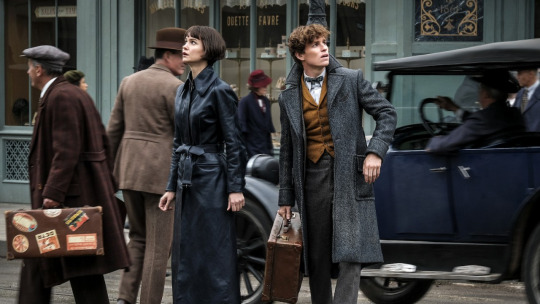
"FANTASTIC BEASTS: THE CRIMES OF GRINDELWALD" (2018) Review
Following the success of the 2016 movie, "FANTASTIC BEASTS AND WHERE TO FIND THEM", Warner Brothers Studios and author J.K. Rowling continued the adventures of former Hogwarts student, Newt Scamander with the 2018 sequel called "FANTASTIC BEASTS: THE CRIMES OF GRINDELWALD". Starring Eddie Redmayne, the movie was directed by David Yates.
"FANTASTIC BEASTS: THE CRIMES OF GRINDELWALD" began in 1927, less than a year after the events of the 2016 movie. In the film's opening, the Magical Congress of the United States of America (MACUSA) is transferring the powerful dark wizard Gellert Grindelwald from their maximum security prison in New York City to London. The latter is be tried for his crimes in Europe. But with the aide of Grindelwald's follower, MACUSA agent Abernathy, the wizard manages to escapes during the transfer. Three months after Grindelwald's escape, magizoologist Newt Scamander appeals to the Ministry of Magic in London to restore his revoked international travel rights following his previous adventures in New York City. While at the Ministry, Newt learns that his former Hogwarts classmate, Leta Lestrange, is engaged to his brother Theseus, an auror in the Department of Magical Law Enforcement. The Ministry offers to restore Newt's travel rights if he assists Theseus in locating Credence Barebone, the American obscurial believed to have been killed in Paris. He has been detected in Paris.
Grindelwald is also searching for Credence. He believes that only the latter is powerful enough to kill his "equal", Hogwarts Professor Albus Dumbledore. Newt declines the Ministry's offer, but is is secretly summoned by Dumbledore, who also tries to persuade Newt to locate Credence. Dumbledore under constant Ministry surveillance for refusing to confront Grindelwald, who was a former close friend from the past. Upon his return home, he discovers that his American friends, the non-magical Jacob Kowalski and witch Queenie Goldstein had left New York. Jacob has retained memories of his past adventures with Newt and the Goldstein sisters, despite MACUSA's citywide Obliviation order. Queenie and Jacob had followed Queenie's sister Tina to Europe, where the latter is searching for Credence. Newt also discovers that Queenie has enchanted Jacob into eloping to Europe with her to circumvent MACUSA's marriage ban between wizards and Muggles. After Newt lifts the charm, Jacob and Queenie quarrel about the marriage law, and the upset witch leaves to find Tina. Newt ignores the Ministry's travel ban and with Jacob, head for Paris in search for the Goldstein sisters and Credence.
"FANTASTIC BEASTS: THE CRIMES OF GRINDELWALD" proved to be an unpopular entry in the HARRY POTTER movie franchise. Even a year before the film's release, many had criticized the film's producers, including J.K. Rowling, for allowing actor Johnny Depp to take over the role of Gellert Grindelwald in the wake of his controversial divorce. Ironically, once "THE CRIMES OF GRINDELWALD" hit the movie theaters, both the critics and many moviegoers expressed other reasons for their displeasure. Either these criticisms were merely used as shields to hide their displeasure at Depp's presence in the movie, or they genuinely did not like it. Although "THE CRIMES OF GRINDELWALD" actually managed to make a profit, it did not make as much as its 2016 predecessor. Nor did it make as much as Warner Brothers Studios had anticipated. So . . . how did I feel about the movie?
I will admit that I have some problems with "THE CRIMES OF GRINDELWALD". I never admitted this in my review of "FANTASTIC BEASTS AND WHERE TO FIND THEM", but I had noticed Rowling's habit of creating two or more disjointed story lines and allowing them to connect near the end of the film. As much as I admired her use of this narrative structure, I must admit that there were times when I found it frustrating. To be honest, I found it more frustrating in "FANTASTIC BEASTS AND WHERE TO FIND THEM", especially during Newt Scamander's search for his missing animals. But in "THE CRIMES OF GRINDELWALD", there were times when I found myself wondering why Rowling had focused so heavily on Leta Lestrange's character arc/backstory and Queenie Goldstein's problems with her non-magical love, Jacob Kowalski. I also had a problem with Colleen Atwood's costumes. On one level, I found her costumes very attractive, as shown in the images below:

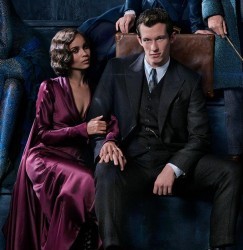
And yet . . . aside from the costumes and hairstyle worn by actress Katherine Waterston, I found the other costumes and hairstyles reminiscent of the early 1930s, instead of 1927, the film's actual setting. Speaking of the timeline, could someone explain why Minerva McGonagall was a teacher at Hogwarts School of Witchcraft and Wizardry, when either the Harry Potter novels or the franchise's official website made it clear that she was born in 1935, eight years after this movie's setting. And since Dumbledore was the Transfiguration professor at Hogwarts in 1927, what was the young Professor McGonagall teaching?
"FANTASTIC BEASTS: THE CRIMES OF GRINDELWALD" had its flaws, like any other movie. But I enjoyed it very much. Actually . . . I enjoyed it slightly more than I did the 2016 movie. The reason why I enjoyed it more than the first film is probably the reason why many others liked it less. J.K. Rowling had written an emotionally complicated tale that reminded me that humans beings are a lot more ambiguous than many are STILL unwilling to admit. They might pay lip service to the ambiguity of humans, but I have encountered too much hostility directed at movies willing to explore the complex nature of humans and society in general . . . especially in pop culture films. Some might claim that such ambiguity has no place in pop culture films and franchises. My response to that claim is . . . why not? I see no reason why humanity's ambiguity should only be tolerated in films being considered for the film industry's award season.
I noticed in "THE CRIMES OF GRINDELWALD" that the majority of Gellert Grindelwald's followers were not "dark wizards" or superficially evil. I must admit that the Vinda Rosier, Grindelwald's loyal right-hand follower, seemed to be the film's closest example of the future Deatheaters that followed Lord Voldemort aka Tom Riddle Jr. Most of Grindelwald's other followers seemed to be typical human being who has allowed his or her emotions to indulge in the usual prejudices or make bad choices. One example is the MACUSA agent Abernathy, who had earlier supported President Seraphina Picquery in the 2016 film. But the prime example in "THE CRIMES OF GRINDELWALD" proved to be Queenie Goldstein, the New York-born Legilimens (telepath), who out of her desperation to be with the non-magical Jacob Kowalski, turned to Grindelwald to help her achieve her desire. Many fans had condemned the movie for this portrayal of Queenie. And I do not understand why.
"FANTASTIC BEASTS AND WHERE TO FIND THEM" had already hinted Queenie's desperation to be with Jacob, when she conveyed reluctance to follow MACUSA President Seraphina Picquery's orders to ensure the erasure of his recent memories. She broke the rules even further by paying a visit to Jacob's new bakery in one of the film's final scenes. More importantly, Queenie had discovered that Jacob had retained some memories of his adventures with her, Tina and Newt. This is why I am not surprised that Queenie had resorted to desperate measures in "THE CRIMES OF GRINDELWALD" to make Jacob her husband. Love might lead a person to do wonderful things. But it can also lead someone to make questionable or terrible decisions. J.K. Rowling understood this. I never understood why so many people were incapable of doing so.
The ironic thing about "FANTASTIC BEASTS: THE CRIMES OF GRINDELWALD" is that the movie not only featured former protagonists like Queenie Goldstein and Agent Abernathy, who had decided to follow Grindelwald, it also featured . . . Leta Lestrange. Any fan of Potterverse will remember another character with the Lestrange name - Voldemort follower Bellatrix Lestrange. Although Bellatrix had married into the Lestrange family, fans learned that her husband was another one of Voldemort's highly murderous and faithful followers. I do recall that the 2016 film may have hinted that Leta was briefly as someone from Newt's past who may or may not have deliberately led him into trouble and expelled from Hogwarts. Thanks to "THE CRIMES OF GRINDELWALD", audiences learned that Leta was NOT someone who lived up to her pure-blood family's name and who proved to be a different kettle of fish. She was not perfect. Her one crime . . . which led to years of guilt . . . stemmed from resentment toward her father's sexist desire for a male heir. As a young girl aboard a sinking ocean liner headed for the United States, she made an ugly decision that affected both her family and Credence Barebone.
The characterizations of both Queenie Goldstein and Leta Lestrange, along with Gellert Grindelwald's followers made J.K. Rowling's intent to continue her ambiguous portrayal of the Wizarding World of Harry Potter. But instead of viewing this ambiguity from a growing child, audiences get to witness this ambiguity through the eyes of an adult. Instead of realizing that individuals we might perceive as "bad" can also possess decency within, Rowling seemed to be hinting that those whom we might originally perceive as "good or decent" can allow their emotions to make terrible choices or embrace evil. Granted, fans learned in the previous series that Albus Dumbledore had once skated on the edge of giving into some parts of his baser nature. But through characters like Queenie Goldstein and Agent Abernathy, agents get to see how originally perceived "decent" characters can allow their emotions and desires to embrace evil . . . not for any moral good, but due to their own selfishness or prejudices. It is a pity that so many are unwilling to explore this journey with Rowling.
Although I had criticized the film's costumes for resembling the fashions of the early 1930s, instead of the late 1920s, I must admit that I found Colleen Atwood's designs very attractive and very original. I rarely comment on a film's editing, but I found Film Editor Mark Day's work in the movie first-rate. I was especially impressed by his work in two particular sequences - Grindelwald's escape in the film's first action sequence and another one featuring a wizarding freak show in Paris. I was also impressed by Philippe Rousselot's cinematography . . . to a certain extent. Rousselot's photography struck me as beautiful and memorable - especially in the Parisian scenes and one particular flashback scene in the Atlantic Ocean. But I really disliked the monochromatic tones (blue, green or yellow) that seemed to dominate the movie's photography . . . as much as I disliked the brown tones that dominated "FANTASTIC BEASTS AND WHERE TO FIND THEM". Also, production designer Stuart Craig, set designer Anna Pinnock, the art direction team led by Martin Foley and the special effects team all did an exceptional job to re-create the wizarding worlds of New York, London, Scotland and Paris.
"FANTASTIC BEASTS: THE CRIMES OF GRINDELWALD" featured some first-rate performances. Lead actor Eddie Redmayne, Katherine Waterston, Dan Fogler, Carmen Ejogo, Claudia Kim and Ezra Miller all gave excellent performances. But there were performances that I found more than first-rate. Jude Law was superb as the enigmatic and younger Professor Albus Dumbore, who seemed warm and manipulative as ever. William Nadylam gave a very complex and passionate performance as Yusuf Kama: A French-Senegalese wizard who has spent many years obsessively searching for Credence, whom he believed was responsible for the death of a family member. Callum Turner's portrayal of Theseus Scamander, Newt's brother, first seemed pretty solid. But his performance became more complex and interesting, thanks to Turner's skillful acting. Alison Sudol gave an outstanding performance as the increasingly desperate Queenie Goldstein, who allowed her love for Jacob and emotions to lead to a morally questionable decision. Zoë Kravitz was equally outstanding as Newt's former love, Leta Lestrange, who became emotionally troubled and confused over a morally questionable decision from the past. But the best performance, in my opinion, came from Johnny Depp, who portrayed the film's main villain, Gellert Grindelwald. Depp's Grindelwald seemed like a completely different kettle of fish from the more obvious villains of the Harry Potter novel. More subtle, subversive and manipulative. Insidious. The franchise's Palpatine perhaps? Honestly, Depp's Grindelwald made Tom Riddle Jr. aka Lord Voldemort seem like a rank amateur as far as villains go.
This 2018 sequel to "FANTASTIC BEASTS AND WHERE TO FIND THEM" proved to be a disappointment at the box office. Between the controversy over Depp's casting and the hostile reaction to the Queenie Goldstein character, I guess I should not be surprised. But I am disappointed that the majority of moviegoers had failed to appreciate Rowling's story, because I thought it was first-rate, thanks to her screenplay, David Yates' direction and the excellent cast led by Eddie Redmayne. To be honest, I personally feel that it was slightly better than its 2016 predecessor. Perhaps one day, more filmgoers will be able to appreciate it.
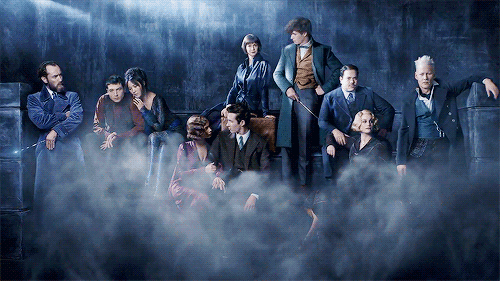
#fantastic beasts: the crimes of grindelwald#harry potter franchise#fantastic beasts the crimes of grindelwald#newt scamander#gellert grindelwald#queenie goldstein#credence barebone#leta lestrange#eddie redmayne#katherine waterston#dan fogler#alison sudol#Johnny Depp#jude law#zoe kravitz#callum turner#ezra miller#claudia kim#carmen ejogo#william nadylam#J.K. Rowling#David Yates#poppy corby-tuech#kevin guthrie
14 notes
·
View notes
Note
Was there ever a racer who made it to the Piston Cup and ended up with a team that worked after hours and overtime to make their team the best it could be, only for that racer to like. Show no initiative, not try at all, and make altogether utterly subpar laps around the track come race day? How did that go down? And given how completely opposite that behavior is to what being in the Piston Cup means, who was the most let down? His team owner? CC? Pit crew? Competitors? The analysts? The fans?
Pretty sure I recognize the parallel that prompted this ask XD
Allow me to analyze this much deeper than anyone should…
The Piston Cup is such a prestigious level of circuit racing that it’s nearly impossible to reach without giving up everything to focus on your racing passion. Even then, sometimes it’s not enough. How could someone just hitchhike their way into the big leagues? It seems impossible.
But that’s not to say that it hasn’t happened. Historically there have been three periods in Piston Cup racing history where the racer turnover was at an all time high - the mid-fifties when the manufacturers started focusing more on speed than simple luxuries, the late sixties and early seventies when they engaged in the horsepower war, and what we see in Cars 3 with the next gens using technology to their advantage. Wiping most of the field clean and bringing in new talent is a messy sort of business.
No team wants to be left out of the game because they refuse to embrace the future. If they don’t hop on the bandwagon as it passes, they’re going to get left in the dust, and what happens when you don’t do well? You lose sponsorship, you make less money, your employees and your team are less happy, and therefore don’t work to their full potential. Why should they when they know they’re not gonna do any better than P30 at any given race? They start to question why they’re even there. It’s a slippery slope leading to the death of a racing team.
When changes happen, they happen rapidly. Let’s take what we see in Cars 3 as an example to further elaborate. In less than a handful of races, half the field has cycled to employing next generation racers. In only a few races, the seasoned veterans we all love are no longer the best of the best, but instead a bunch of rookies that have barely been around long enough to know what pavement actually feels like under their tires. By the end of the season? There’s maybe three cars that aren’t next gens.
Fearing death itself, all these race teams that made the sudden switch to a new racer didn’t really have time to sit back and get to know the racer super deeply beforehand. Are they fast? Check. Are they rockstars on the simulator? Absolutely. Have they gone to some remotely ‘prestigious’ training center? Uhhhh, sure. Do they want to race? Well, they’re racecars, aren’t they?
The lack of relationship between team and racer can’t be solidified under the stresses of mid-season racing. The crew and the racer just don’t know each other well enough to read between the lines while communicating. Making a crucial decision in the last stage of a race based on which octave the racer is giving feedback in can be problematic for a racer that sounds akin to a dial up tone. Some racers don’t appreciate joking during a race while others can’t seem to take basic constructive criticism. Some teams just become complete basketfires, making mistake after mistake because they just don’t know each other.
But it’s not all bad. Aside from Jackson outperforming everyone, there are a few other racing teams consistently performing at the front of the pack. We see Chase and Danny a lot. They were some of the first next gens to be brought onto the track before the entire sport jumped on board. It seemed like a few teams were prepared for the switch - and those were the ones that spent time investigating the newest generation of up and coming racers. The relationship, or lacking that, a general sense of a racer’s enthusiasm, was already noted and confirmed.
But back on track. The teams that weren’t prepared to make the switch to a new racer - they made their decision in a hurry. You know how sometimes someone can look really good on paper, and even make themselves sound good, but when it comes down to it, they’re a worthless employee? I would almost guarantee that at least one of the next gens fits this bill.
It was probably some mid-range team looking for change and embracing the first thing that came along. The racer they ended up with is a lot like that kid whose parents forced him to go to college and get a degree and then paid for all of it for him. He’s not motivated. He’s not had to try and push himself to achieve anything spectacular his whole life. He doesn’t know what it means to truly love and be passionate about anything. He’s fast, yes. He has technical knowledge about how to race. He even knows how to apply it. But does he want to? There’s no conviction there. Speed is a fleeting metric. What’s fast one day will be slow the next. If a racer has no other redeeming qualities about him, there’s no point in keeping him. It’s time to move on.
In the wake of the next gens overthrowing the Piston Cup as we knew it, he’s just another name no one knows. In a field of forty very fast cars, someone’s gotta bring up the rear. Might as well be him. He’s still getting paid handsomely, why should he try any harder?
The fans don’t really know him. There’s a few that like him just for his paint scheme and apparent laid-back personality, but that’s it. The racers ignore him and push past him. The commentators brush over mentioning him unless he’s caught in a wreck. The analysts never consider him in their coverage - not even as a garage pick. He’s as far removed from the spotlight as he can get. And he’s fine with that.
But his team is most certainly not. They’re paying him a decent fortune to go out there and win races, and he’s never come close. They’re P20 on a fantastic day. The crew chief and pit crew are the most annoyed. They’re the ones that have to work with him on a regular basis. They’re the ones that suffer when he decides that running real laps a full second slower than his average time on the simulated track is fine. They can work their absolute hardest and not fix the problems that he’s bringing to the table. So why should they even try? They’ve worked their tails off and got no reward. They can only do this for so long.
The team owner takes responsibility, because it was his decision to begin with to bring this racer into the organization that no one knew. He feels guilty. His team shouldn’t have to suffer like this in order to pull off a mediocre day at best. The ripple effect of the racer’s attitude and lack of conviction starts to wash through the organization as a whole and it hasn’t gone unnoticed. This team compared to the team is was a year ago is an entirely different animal, and that needs to change before it’s too late.
They tough out the rest of the season with their halfhearted racer and spend some time genuinely looking at the other racers waiting in line. They get to know a few of them and get a feel for how they’ll perform. They’ll make an educated decision this time, one that won’t devalue their work. They’ll give a young racer a chance to race at the Piston Cup level - someone who deserves it.
17 notes
·
View notes
Text
@themiskatonicgame This is like a whole review of your game I guess! It was too long for an Ask so I just put it in a post.
To anyone else: Spoipers!
Hey, I really really loved The Miskatonic.
But criticisms first:
Char successfully talking down the LH felt rather sudden and anticlimactic, and the ending thereafter more so (I was sure something would go wrong right before she left!).
I feel vaguely disappointed with the theme leaning heavily on "you can't make people be groovy by forcing them to." I really like the mindset of compassion and kindness that Char learned from her coven (and I’m not saying I wanted LH to go free :p ) but the way those ideals played out in the story felt to me implicitly dismissive of serious bigotry and exploitation in real life against which violent and otherwise direct action can be necessary.
I’m iffy about the Skullgirls-esque tittiful character designs. I mean, I’m a lesbo and I think boobs are pretty great. But character diversity outside conventional attractiveness is really important. And I think those things aren’t necessary mutually exclusive.
The good stuff though:
Pretty much all the writing and interactions were an absolute delight and real real funny and often cute. I love the adorable speech patterns on people like Annie and Lizzie. I love Charlotte’s no-bullshit-but-actually-I-kind-of-love-it attitude, and also everything else about her. I usually have a hard time getting through the text slog of visual novels, but this was a treat from start to finish and pretty much every character in it had me excited to see them again each time they showed up.
I really love the tone, and the dark humor, and the world just filled with different flavors of commonplace horror. I loved everyone’s freaky creepy mutations. Especially the ones with tentacles. For whatever reason (well, okay, it’s a trans thing) body horror and mutation are really personal to me and it was really really cool to be in world where it was everywhere and it was sometimes horrible but sometimes cool and sometimes just normal... and it was always CUTE.
I know I criticized the character designs earlier, but they are also cute as fuck. I <3<3<3 all the girls. And the guys are pretty cool too.
One seemingly small thing... it made me incredibly happy that Charlotte and Annie’s elopement Actually Happened. It felt like it was speaking straight to those of us who always fall in love with the characters that the protagonist finds strange and off-putting. It’s so incredible to me that this obnoxious, lecherous, gross, profane, and frankly terrible woman and her shit-eating grin were allowed to be cared about and important, that we were allowed to play a character who was happy to see her, who wanted to spend the next stage of her life with her. I loved that Charlotte engaged with the world the way I wanted to - making herself at home with the weirdness, meeting it on its own terms as something cute, or horrible, or kinda sexy, while keeping a level head and an unconditional kindness. VN protagonists are always, like, The Ultimate Normal Guy, but for once we get to follow someone who reacts to the weirdness with something other than fear and revulsion.
A couple of smaller things that I really appreciated:
1. It was easy to follow along with Charlotte’s thought process. In her detective work especially, it was totally clear what she made of each piece of evidence, what conclusions she drew, and how her view of the situation and the university was changing at each stage. A lot of media leaves me behind when I can’t understand the main character’s train of thought!
2. Even though it’s dark comedy, morality is still real. It was really pleasantly surprising to me how consistently Charlotte reacted like a decent person in the face of awful things, without it undermining the humor, and I think it preserved a whole lot of character integrity and audience empathy that most media like this forfeits.
3. Finally, I’m very happy Lizzie got her grilly cheese.
All in all, I just wanted to say it made me really happy getting to visit this awful little world. This is a game I’ll come back to again.
P.S. Nutty Annie can eat my ass anytime.
16 notes
·
View notes
Text
Black Romance
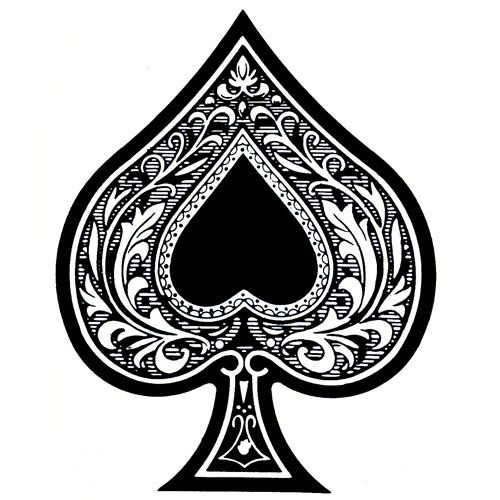
The Black Quadrant of Troll Romance intrigues me to no end, and makes my thoughts churn like a creative slurry in a bucket, wandering what exactly its like under long term circumstances, the little intricacies of unwritten rules and expectations to be found within this sort of relationship.
How did it even first occur? What in Troll biology cause it to be a such a strong fixture in their social culture?
Perhaps these questions will be answered one day... probably in a way that makes me wish they hadn't and force me to moan like a lil bitch in disappointment.
We can only speculate for now however... which is what im going to do.
In its history, Black Romance likely started as a genuine desire to kill a rival, likely over the feelings of the same Matesprite, but unable to do so, in spite of the genuinely serious trying at mutual murder, only to find they dont mind each other so much, even if they dont like many other aspects about them~
Even though they try to kill their rival they actually begin to make one another as strong as possible through constant conflict. Like two Knights sharpening their skills in a friendly sparing match. After all, what doesn't kill you, makes you stronger. Given Troll society, they likely take this notion to heart.
Through this rivalry, their partner is made as strong as possible, so they may live to see each other again another day.

I think, in my opinion, a Black Romance is a relationship born of Hate and Irritation, but evolves into a genuine mutual love and respect.
It starts as Hate, but becomes Love over time.
They may start in opposite directions, but they ultimately end up in the same place.
Any actual pain inflicted upon your rival is to make them dulled and numb to that pain. Makes them ready to deal with it mentally. Their weak traits being absolved or mitigated to some extent, and their strengths expanded and reinforced.
The individuals, sharpen each others knives for their partners to use one another, so that they may also sharpen their skills, ensuring that they are both full prepared for the trials ahead.
A Black Romance usually revolves around the two partners actually trying to hurt and injure one another, both verbally and physically, but not cripple, maim or kill their opponent. Its the two trying to Dominate, but not so thoroughly as they cannot grow as individuals. To remove the blemishes in their techniques, working out the kinks in execution.
Blackroms must have times of bonding and enjoyment, a break from the conflict, to relieve stress... by ♠any♠means♠necessary♠~
This often revolves around the two Haters tending to eachothers wounds, and enjoying the typical Red Romance activities, like dinner and a movie, albeit with a side of snark, super sized. Probably poisoning their partners meal, just enough for them to get an upset stomach and vomit over it all.
Signs of affection take the forms of hand holding, kissing, and small levels of antagonisms such as harmless insults or mild scuffles. One method is manipulation to encourage romantic retaliations, such as stealing clothes, pranking their rival, or even publicly humiliating them in way that will embarrass them but wont destroy their standing or self-esteem.
Anything that gets under their skin without causing permanent harm goes and one must always be on guard and never show signs of weakness or reveal any information to their kismesis, lest they use this against their partner.
One sign of devotion in a relationship is wearing the colors of your partner. In the case of a Matesprit, its their favorite color.
In the case of a Kismesis, its their blood color, or at least a color they may hate.
All relationships are born of trust, but for a Kismesissitude, it is far more important, for they must both understand they are not trying to kill eachother while trying to wound one another.
A good sign of trust is allowing your Kismesis to wear your clothes with minimal reservation, as they probably wont destroy it outright, but probably will at least modify it, such as dying it another color.
This trust is what is crucial for it to succeed, they have to try and hurt without killing. And due to nature of the relationship, they try to one up each other constantly.
Stabbing someone in the arm may result in them cutting off your hand in response.
This often results in the one of them killing their partner kind of unintentionally while being caught up in a whirlwind of passionate hatred~
Sometimes in bed even.
These bouts of hate filled fighting can spill over into society at large, causing damage and injury to others and their property.
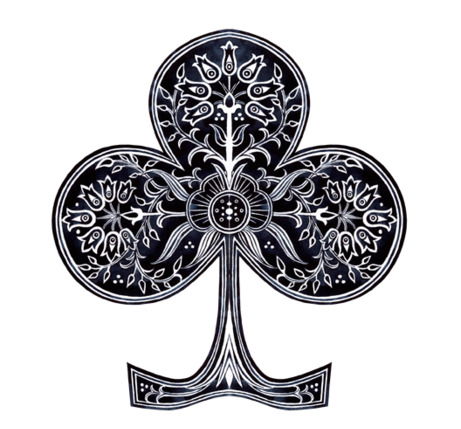
This is why the Auspices were founded~
The importance of the Auspice in a Black Romance is critical, for they serve as the referees, and prevent the relationship from getting out of hand. The loss of one or both individuals can be devastating to the group, especially if they’re of great standing and use to said group. Losing your own members to themselves is embarrassing to say the least.
They at minimum, keep the two individuals focused, preventing them from getting embroiled in their bitter dark chocolate freakishness, and having them stay civil as well as decent in public.
Anyone can be an Auspice, be they a passing stranger, or a concerned friend. But many Auspices are more permanent fixtures, usually one party members current Moirail or Matesprite.
But most often, it is normally a third party that is a mutual friend, that aides in keeping things from getting out of hand. A platonic friend that can help cool the flames and calm the storms, so the ship will not sink.
But Not All Ashenroms Are Platonic~
Some Are Polyamourous Relationships Where The individuals Engage in Mutually Consenting Frivolity In Their Own Various Ways, Be They ♥Flushed♣Or♣Pitched♠ And Can Vary On The Individuals Involved, Creating A Sort Of Menagerie Of Earthly Delights, One Could Compare To A Candy Store With A Wide Variety Of Sugary Treats To Suit Every Taste~~~
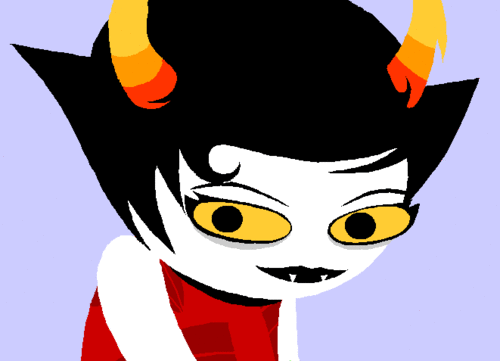
Which Makes Such Relationships Quite Appealing To Most People~

However, there are times when someone is Auspicing for their own selfish desires. Attempts may be done by the Auspice to change the nature of the relationship, and pull an individual into another Quadrant.
This is why they are known to be “Meddlers”, and prolonged Ashroms are rare, especially when they dont make it to the bedroom.
When they do make it in, its normally so the two individuals can pail and the 3rd party ensures they dont kill one another and nothing more. Once completed, the relationship may continue or end.
If an Auspice doesn't know what they are doing, they may be unable to keep up and be ineffective, or even make the situation worse.
But in the case that an Auspice does succeed, and pays their cards right, everyone can have a grand old time together, creating a rare instance where more than two individuals has a well balanced Romance with variety.

Black Romance often ends in two rivals breaking apart, either they cant handle the stress or one of them dies, usually at the hands of their partner. Or one of them simply gets bored, and doesn't feel fulfilled like they once were.
A Black Romance is after all, based in enthusiastic engagement, and it is not unusual for the relationship to end in mutual separation.
But there are times when one side loses the romantic aspect, and the hate turns true and genuine, and kills their partner on purpose.
There are even instances of cruel situations where one partner is manipulating their other for dark machinations.
Machinations that are Darker than Black
Abuse does often occur, but a proper Pitched relationship has consent, subtext and subtle hints giving expressing desires, and when fulfilled, there is aftercare, wounds are dressed, and reminders that there is affection. Should a deed go too far, a boundary overstepped, a true Kismesis will in one way or another, express regret and remorse over a transgression.
Transgression may include overly controlling behavior, emotionally isolating them, direct harm with intent to cripple or kill, engaging in a relationship with your Kismesis’s actual enemies who want to kill them, destroying what is valued and cant be replaced and manipulating them for personal gains at their permanent expense, especially when they cant afford it.
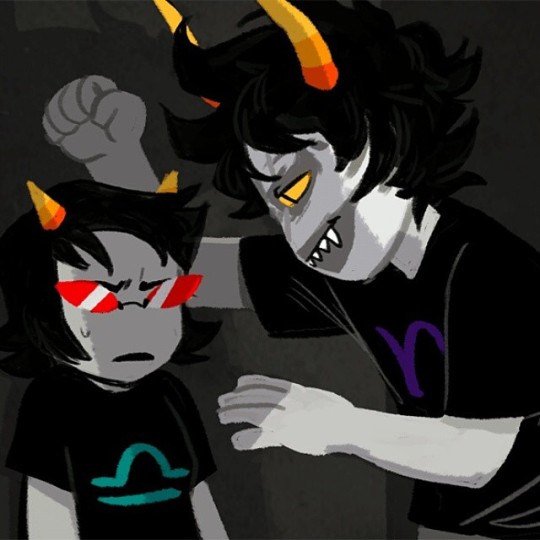
A Kismesis cares for their partners feelings and well being, and a good one goes out of their way to ensure they are secure and safe, even when having fun.
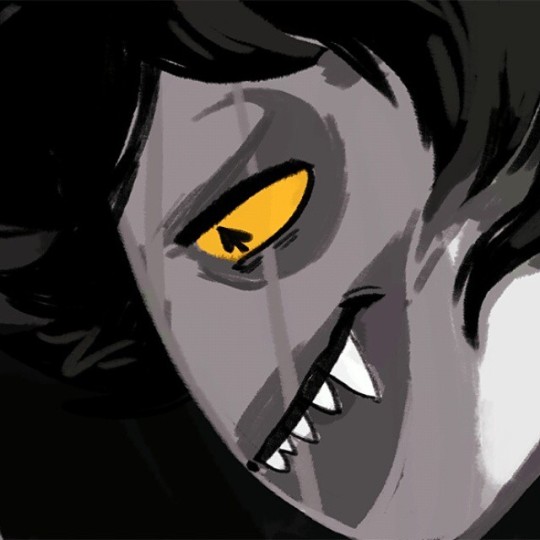
An abuser does not.
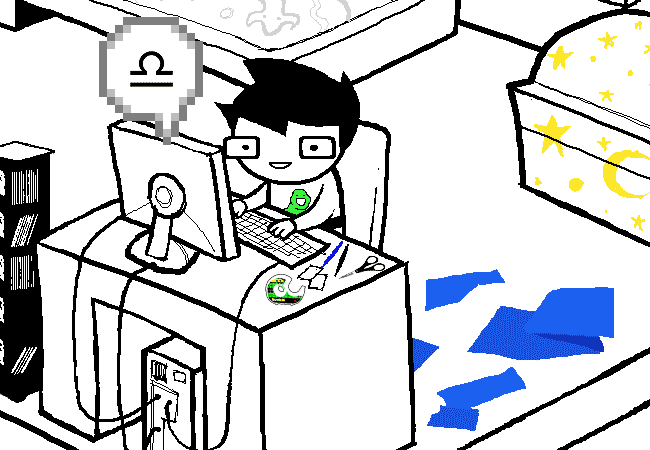
But then there are the very rare instances, where Kismesissitude is so strong and so stable and healthy between partners, that they seemingly end up in the same place as a end of a Flushed romance.
A truly loving rivalry, whose only goal in it, is the joy of having it.
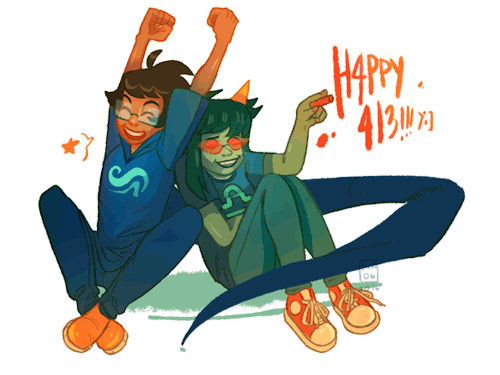
When it happens, its like Black Magic.
The two seem to engage in bantering and mutual antagonism, yet its clear they’re enjoying each other in the act. Vacillating between Red, Black and Pale all within moments.
Should a Black Romantic Couple reach this level, they stay together simply because they love being together.
Marriage exists within Troll society, though it is rare, especially when its outside ones blood caste.
Black Marriages are particularly rare, as the process of getting Hate Married is rather intense.
A proposal involves biting off eachothers right ring finger and swallowing it. Which is pretty hardcore if you ask me.
Which turned out to be too hardcore, which was phased out for simply biting a wound into their partners finger instead
youtube
Which was also phased out as it was a custom from a time before oral hygiene was a thing, people died due to infection.
Afterwords it became a case of merely scaring, then branding, then finally tattooing in your fiance’s sign in their blood color on your right ring finger.
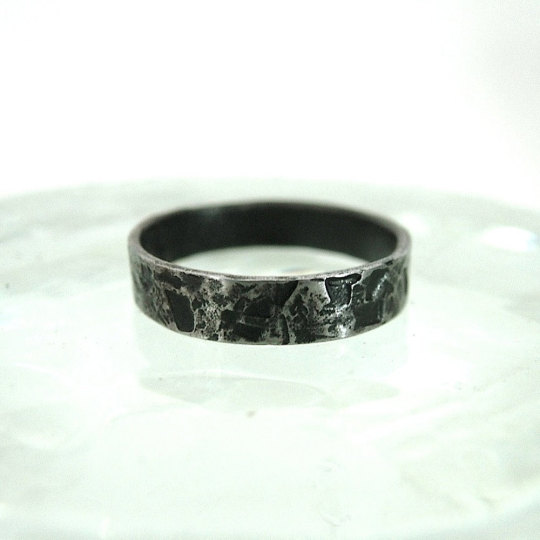
A simple wedding ring is also acceptable, usually some cheap metal, like a Black iron ring.
Finally, the two tell each other a special secret about one another, usually something quite humiliating, as a means of making blackmail, so that either one wants to declare a divorce, they simply air their others dirty laundry.
#blackrom#black romance#Spade#ashrom#ashen romance#johnrezi#terezi pyrope#john egbert#homestuck#hiveswap
47 notes
·
View notes
Link
this article is dumb, i shouldn’t be hate-reading and you shouldn’t either but here we are so let’s do this:
We begin with a description of a platformer doing something clever and metatextual at the end. Followed by;
What this means is that the game stands in stark contrast to an industry whose products, historically speaking, rely on hijacking the reptile brains of hormone-crazed teenaged boys. In short, the history of videogames is the history of the glorification of violence.
Ah yes, who can forget such bloodthirsty products of the military-industrial complex as Pong, Tetris, Pacman or Zork?
We can debate what constitutes the first videogame, and whether it’s fair to attribute the invention of videogames to the military,
Given the contentiousness of that assertion, I should certainly hope so!
but what’s undeniable is that military engineers—ever ready to coopt, conspire with, or commission innovation from the private sector (e.g., the splitting of the atom, the invention of I.Q.)—more or less immediately recognized that videogames could be employed as a cheap substitute for teaching soldiers how to do everything from fly a plane to take out a sniper.
Kinda reductive to reduce the history of video games to FPSes in general and America’s Army in particular, doncha think?
Anyway, then we get some more waffle about how first-person shooters video games are training us to kill, before we get to the real question: given that this platformer he just finished playing did something a little artsy, can video games be art even despite the fact that were originally works of military propaganda intended to inure potential military recruits to violence? And more importantly, given that this guy seems to think the history of video games began with first person shooters, is he really qualified to answer this question?
Then we get some pointless side chatter over the claim that games are good for your brain, followed by the charge that games are addictive--despite the explicit comparison made to gambling (at “your local Native American casino,” no less), there is no discussion of lootboxes or microtransactions whatsoever, suggesting the author is not aware of specific steps which are taken to make games addictive and is just invoking vague notions of all games being addictive. None of this ever comes up again, and we promptly move back to talking about the actual game.
More specifically, Inside is what’s known as a “2D side-scroller”—meaning that you observe your figure mostly in profile in the center of your screen while a background landscape scrolling right-to-left gives the illusion of left-to-right forward motion.
Somehow, the use of the term “2D side-scroller” in quotes does not make me feel that this fellow is sufficiently familiar with video games to assess whether or not they can be art, as does the fact that he reckons that the platformer he is playing hearkens back to a 1981 shoot-em-up he remembers from his teens, which makes his apparent conviction that video games originated as first person shooters all the more baffling.
And while the world of videogames has already become a “spectator sport,” I’m unaware of any instance of the record of a videogame player’s performance becoming intellectual property, as it has in the world of chess, and in a whole array of sports. True, gamers go “professional” by attracting followers on the internet and earning ad revenue, but their play itself is not copyrighted. Games might wind up in museums (worldwide, there are at least seventeen museums dedicated to videogames), but bracketed moments of the play of particular games have not yet become value-able as art.
I invite the author to start selling unauthorized DVDs of clips from popular Twitch streamers and gaming YouTubers and see how long their lawyers allow him to entertain the notion that Let’s Plays do not constitute intellectual property.
the 2D side-scroller and its pitbull of a cousin, the first-person shooter,
???
The rest of the section is pretty unremarkable, so we move onto him complaining about lousy movie critique, then lousy video game critique, then explaining the concept of Easter eggs, then video game puzzles:
The puzzles of Limbo and Inside are more ambitious than the puzzles of most games in that their solutions often require the player to wait, or to exhibit what in psychology and education circles is known as divergent thought—for example, a corpse is a corpse, but it is also potentially a deadweight that can be used to spring a boobytrap.
Making the player wait or use an unusual object as a weight doesn’t strike me as particularly devilishly clever.
Then we get this jewel of a paragraph:
Nevertheless, puzzles themselves stand as an obstacle blocking the path of videogames’ journey from game to art. For while I might willingly suspend my disbelief long enough to accept that a boy has been tasked with jogging exhaustedly through a factory that churns out invincible blob creatures, I will find that willingness strained when I am also confronted with confounding puzzles placed in my path for no good reason. Videogames, in other words, ignore the basic tenets of internal consistency—in order to keep playing, you must suspend your disbelief, and then suspend it again, and again, and again, which means that in order to play and enjoy videogames you must also suspend the kind of critical judgment that is normally associated with art.
You heard it here, folks, accepting weird gameplay conceits means you can’t critically analyze a game.
Similarly, Easter eggs appeal only on the level of geek fetish—which is more or less the opposite of critical appreciation—and it is for this reason that I won’t address the puzzles and Easter eggs in Inside, even though they eventually lead to what some have concluded is the game’s “hidden meaning.” And this is the problem of videogames in a nutshell, because meaning in work of art is no more hidden from its beholder than the summit of a mountain is hidden from the mountain climber.
Sounds to me more like the problem is that he’s ignoring what the game itself is telling him about its plot and themes because it’s doing it in a way he finds aesthetically displeasing. I don’t know much about critical analysis but I feel like that’s not really how you should be doing it.
We then get a description of the plots of Limbo and Inside, including a decent bit of analysis marred by a bit of “murder simulator”-ism.
This is worth noting because prior to this moment the violence the boy has inflicted, either in Limbo or Inside, has been indirect—really an act of self-defense—but now the game is threatening to creep back into the usual videogame mode of affectless murder. You are given a choice: slip backward toward the wantonly horrific likes of Grand Theft Auto (1997) and Postal 2 (2003) [3] , or pause a moment and then continue on in a macabre but not morally bankrupt pursuit narrative. In this way, the player is implicated in a wryly disjointed bit of commentary on the history of gaming itself.
I mean this entirely sincerely: someone should get this guy a copy of Undertale. I think he’d enjoy it, if he could get past the idea of having to accept JRPG conventions.
Sadly, video game still aren’t art because he can list a bunch of movies that had vaguely similar elements:
From there, it’s not hard to find antecedents for Inside in both literature and film—it’s a little bit Soylent Green, a little bit Logan’s Run, a little bit The Island of Dr. Moreau, and more than a little bit Frankenstein. The imagery starts to seem familiar, too, with milieus lifted from E.T., Alien, and The Poseidon Adventure. But all this allusive flotsam becomes a bit of a disappointment, as eventually you become hard pressed to find anything in Inside that you haven’t seen inside something else.
Ezra Pound demanded that artists “make it new,” and Marcel Proust insisted that a writer is someone who invents a voice as unique as his or her fingerprint, but Inside isn’t even really trying to tell a story that hasn’t been told before. That’s a problem. Art cannot be made up wholly of references to other art. Star Wars, for example, does not come close to art because at its core it is nothing more than a pre-fab mash-up of archetypes mail-ordered from the IKEA superstore of Joseph Campbell.
I mean... why can’t art be composed solely of references to other art? Why can the whole not be more than the sum of its parts? If I take a picture of the Mona Lisa and photoshop a photo of a can of soup over her head, the resulting work is distinct from either of the originals, even though I provided no original content except the idea of sticking the two together.
Put another way, Inside could only have been designed by someone who hasn’t read Roland Barthes’s “The Death of the Author,” and hasn’t read Walter Benjamin’s “The Work of Art in the Age of Mechanical Reproduction,” and hasn’t read T.S. Eliot’s “Tradition and the Individual Talent”—someone who hasn’t, in other words, engaged theoretically with what art is. And that, in turn, leads to the simple conclusion that on the level of its plot Inside is not trying to do what art does.
Good god this guy is snobbish.
Second, there’s still the meta-twist to consider: perhaps Inside is a game with both a text and a subtext. And perhaps a subtext can help the videogame industry evolve beyond the hyperviolence that is its womb and its crutch.
“Hyperviolent” is not exactly how I would describe Breakout or Super Mario Bros. Anyway, he then ponders the potential meaning of the evil scientists at the end of the game being stand-ins for the developers, and comes to the conclusion that...
The problem of games today is that their creators have not imagined any purpose for them greater than fun. There are exceptions to this, of course, but for the most part games equate escape with distraction—to be distracted is to be entertained, and it is good to be entertained.
Unlike the rest of popular media, of course.
The obligation of art, as Henry James described it, is to be interesting, and if you’re paying attention, that is to say, if you’re trying for more than distraction, then Inside begins to be interesting with its name, which stands in stark contrast to games like Call of Duty: Infinite Warfare and Grand Theft Auto: Vice City.
I too enjoy criticizing games for being superficial based on their titles.
Then we get some final analysis, a quote from a Raymond Carver short story I read in high school and remember mostly as something my friends in English class found homoerotic subtext in, and the claim that the goal of art is a feeling of transcendental bliss:
The much remarked-upon narrator of Raymond Carver’s classic short story, “Cathedral,” experiences such a moment as the story climaxes with a blind man helping him draw a church. “My eyes were still closed,” the narrator says. “I was in my house. I knew that. But I didn’t feel like I was inside anything.”
At its most ambitious, Inside aspires to a similar feeling. Escape in art that is not transcendence is cheap, and if you can climb beyond the foolish puzzles and the Easter eggs and the hidden meanings, you can feel, for a moment, that you are not alone on your sofa with your phone, playing a game; rather, you are somewhere else—somewhere grassy, bathed in warmth by a ray of sunlight falling from above.
And that’s nice and all but it feels like he didn’t really lead up to it.
Anyway, I spent way too much time picking through this but here we go. Final rating: 2/10, the next time you want to know if video games are art yet ask someone who actually plays them.
1 note
·
View note
Text
Pillars of Eternity - Definitive Edition: Impressions, Criticisms and Review
Published by Obsidian Entertainment. Original release date: March 26th, 2015. Definitive Edition release date: November 15th, 2015.
Price: $29.99 MSRP. Current Steam Sale: $7.49. Current Epic Games Sale: $9.99 (with coupon.)
This article has also been published on Blogger.com (Mirror Link)
12/23/20

Over the past week or so, as a part of the Epic Games Free Game of the Week promotion, I’ve picked up Pillars of Eternity - Definitive Edition for free and have been playing it on its Normal difficulty almost nonstop ever since. This being the second video game by Obsidian I have played (the first one being Outer Worlds--releasing four years after Pillars had its original release), I felt it appropriate to share some of my thoughts over the quality and experience of this game, comparisons I have made, and some other miscellaneous observations. It’s worth prefacing this with that I have not fully completed a run through this game and haven’t actually completed the game’s second act as of yet (more on this later)--however, I’ve put close to 70 hours into this, and while others have spent thousands of hours on this video game I feel I can write on this with some authority.
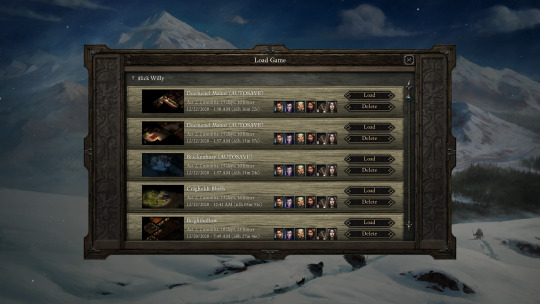
Starting with its strengths, Pillars of Eternity is engaging. There is a lot of content to delve into. Much of its characterization is convincing, and the voice acting that it does have is well-performed. Another YouTube channel that I watch, “Should You Play It,” estimated in their review that “25%-30% of the game is voiced,” which seems like an accurate assessment to me. Regarding its story writing, its overall plot and characters themselves are very reminiscent of a decent or good Dungeons and Dragons campaign. Some tropes can be expected, but overall the plot runs smoothly enough, and the characters themselves are generally rather fun to interact with, even in cases where they're not very original.
The game does suffer from a variety of flaws, many of which aren’t immediately apparent to the player and that bear mentioning. The talent pool that Obsidian recruited to do their voices is incredibly small. Half of my party, as it turns out, was voiced by Matthew Mercer--possibly the most distinguished voice actor of the bunch--with my main character (using the “sinister” voice effects), the story character Aloth, and the story character Eder all being voiced by him. Kana, a character that comes later on, is voiced by Patrick Seitz (famous for many different television, video game and anime roles) and also does a character at the beginning of the game (Sparfel), the voice for the commander of the Crucible Knights, and multiple other additional voices. To my own ears, Richard Epcar had to be the most frequently-appearing voice actor in the game, voicing the Caravan Master at the beginning, Raedric’s voice, the spirit of Od Nua (whom I haven’t encountered yet) and the forge master Dunstan in Defiance Bay, along with other additional voices.
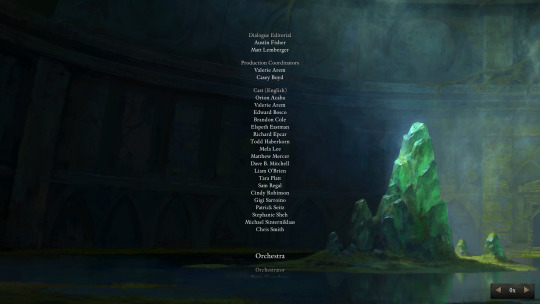
Sadly, Pillars of Eternity’s Credits page as well as the Full Cast and Crew IMDB Page only provide incomplete insight on who voiced which character within this game, and while some message boards exist on the subject I’ve not found a comprehensive resource over this topic (maybe I’ll attempt a full list for myself later on.) It’s a massive rabbit hole to go down nonetheless. The Outer Worlds handles this limitation as well, although that game’s execution of this I’d be inclined to say was a little more successful. Only 1% of Outer Worlds's entire production team were actually voice actors, which strikes me as interesting; the NoClip documentary series discusses details about this as well as how the writers had to plan questlines ahead of time to prevent characters with the same voice actor from interacting with each other, when possible. No definable moments of this happening in Outer Worlds come to mind off memory, although there were a couple of occurrences in Pillars (e.g. Kana and the Crucible Knight commander) where it wasn't avoided.
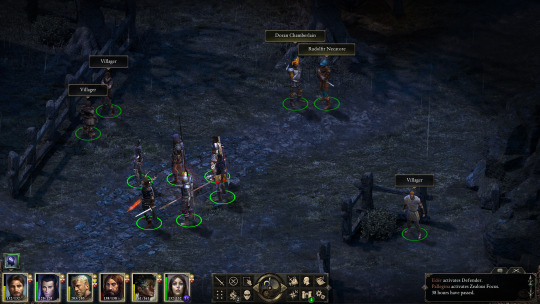
One of Pillars of Eternity’s major problems is interestingly a feature of its design--its Kickstarter rewards implementation. When you visit the first town, you are effectively bombarded with a number of uniquely-named NPC’s--and when you approach them, you get the opportunity to “look into their soul” or walk away. As a new player I was pretty befuddled by this, thinking that these were details I needed to memorize for some upcoming puzzle, when in actuality it wasn’t anything more than crowdsourced product-placement.

Some games can pull this off with success--LISA The Painful, for example, had a majority of its character names sponsored and selected by Kickstarter backers. As an RPG, this worked; you had a name on-screen detailing who it was that you were going to attack (on a black border above your characters), you kill them, and you move on. Other donor rewards involved creating a party member or a boss battle character, but these were done cautiously, and at least in my own experience, they didn’t hinder the game enough for me to discover that these were Kickstarter-donor characters on my own.
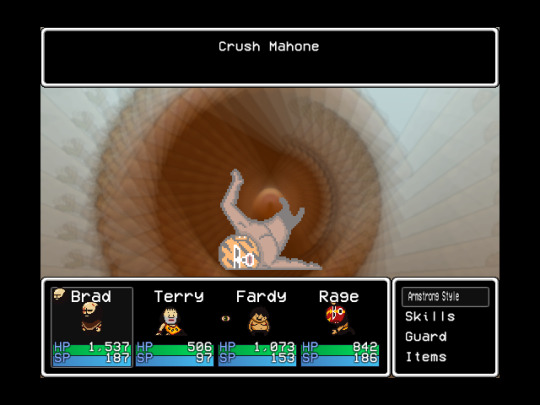
It’s the opposite case for Pillars. In many cases it’s special snowflake-ish. You’ll enter a bar and encounter 5 people named “commoner” and Archduke Franz “Quickfeet” Elfenhein, with a two-paragraph set of memories that mean frick-all to the actual experience. If you read all of these, you *might* encounter one or two funny ones, but what’s the point? You can expect that these were written before a finished product was released. It’s a dilapidated experience. Later in the game you’ll visit a house, with one of these pointless O.C.s effectively “standing guard” for no other purpose than to nick you town reputation points for trying to steal something.
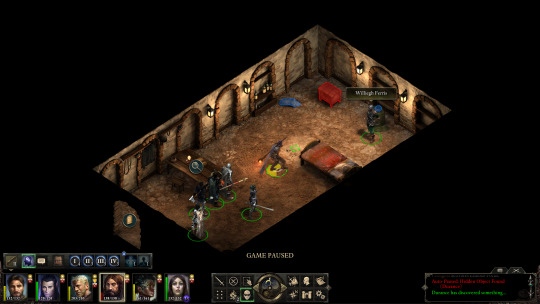
Outer Worlds includes a stealing mechanic as well but it was implemented more fairly. Your character didn’t have to dump a bunch of points into a nearly-useless Stealth skill--instead, it was dictated by NPC line-of-sight. Stealing in Outer Worlds, for the most part, is actually *fun*, in Pillars, it was worth me avoiding entirely.
This may as well serve as a segway into the leveling system--on which I don’t have much to say about it, other than (maybe not relative to other ISO-RPGs, or in comparison to, say, Dungeon and Dragons) that it’s a headache. The story characters that the game gives you access to all have unoptimized and relatively-mediocre starting-stats, so to use all of them (exclusively, without hiring an unvoiced “mercenary” NPC) some creative planning is needed. You’ll also effectively want to min-max your own character’s build to help compensate for inevitable party weaknesses--the game (similar to Outer Worlds) offers a releveling system should you level up the wrong stats, but anything set at character creation is basically unchangeable--which is when the greatest number of character traits needs to be decided. Wizards are good, a priest or two is required (otherwise your party is without a healer), Chanters are bad--but you wouldn’t know this unless you looked it up ahead of time, or unless you’ve played the game before.
And this description leads me to my strongest point--Pillars of Eternity has a habit of setting up unclear rules, punishing players for breaking them, and calling that “replayability.” To be clear, if these “unclear rules” were drawn across moral lines then it wouldn’t be an issue. Fallout: New Vegas has a few main factions that the player could side with and give control of the main world to; all but maybe one of these choices could be argued as potentially being the “best outcome.” Pillars of Eternity (and Outer Worlds to a similar extent) is lacking in a lot of this--*and* game mechanic-wise, the game punishes you for doing normal, explorative stuff and so often sets up inconceivably unwinnable scenarios where you have to be so deliberate about your actions and game mechanic options to actually achieve a (clear-cut) best outcome. Outer Worlds is better with this.

A small example; in the beginning of Pillars, your character encounters some rioting townspeople accosting the owner of a grain mill. If you go inside, the mill owner notes that he is fair in his dealings, although he prioritizes the best of his grain stores to townspeople who need it the most (like pregnant women)--this quest being strikingly similar to one in Outer Worlds’s beginning. If you pass a resolve check of 14, the mill owner will allow for his grain stores to be seized by the rioters. Only if you pass a intelligence check of 12 does he actually lower the prices--and you can postpone solving this quest for an absurd amount of time, waiting until you have the right items and buffs to pass that speech check.

Another example; when exploring the docks at Defiance Bay, your character can notice a shining purple light. If he/she interacts with the light, your character will encounter the memories of a dead child. Should you trigger this innocuous interaction, you will have locked yourself out of being able to talk with townspeople on the disappearance of this boy, which includes the boy’s father, who has since become an alcoholic at the local bar. If you had spoken with the mother first, and then him, and passed a speech check, the man would go back home--otherwise, he’s stuck at the bar forever.
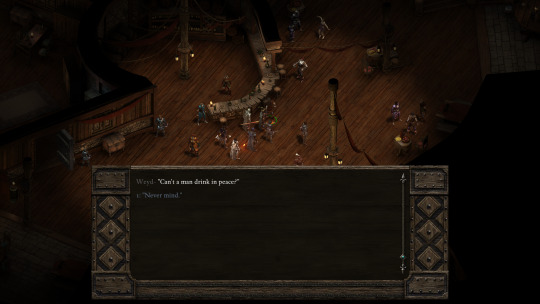
The worst example, *by far* of unfair, “gotcha!” game mechanics has to come from the quests within the game’s DLCs, The White March 1 and 2. Moderate spoilers ahead (warning to anyone concerned with those): you either have to outlaw the study of animancy, make certain dialog choices that lead to a companion becoming an evil crime boss, or lose out on a speech check at the end of DLC 2 when trying to teach mercy and compassion to a “god,” instead getting railroaded into one of two lesser outcomes, *OR* deliberately not finish the game’s second act, do all of the DLC stuff, and then come back if you want all three good endings.
Surely, however, it’s for “replayability.”
It’s punishing in the stupidest ways. Outer Worlds had a few negatives similar to this; you have two major factions that you can ally with, one being cartoonishly evil, and one quest exists where if you neglect to open up some unsuspecting dialog on a computer terminal (and instead delete it straight away) you permanently lock yourself out of a speech check and are then forced to genocide one (or both) of the other factions (or ignore it and get an even worse outcome.) Outer Worlds is metagameable in the sense that you can discover which decisions affect the ending slides ahead of time, and it encourages you to take advantage of its game mechanics a couple of times (particularly with how you can cheese an ending for a certain quest and with how you can cheese stealing a certain poster on Monarch that, by all accounts, an NPC should see you stealing) but certainly nothing to Pillars of Eternity’s scale--and it isn’t as demanding on the player’s time investment, either.
Another criticism--the amount of text present in both games fringes on ridiculous. To quote Philip J. Reed’s review on The Outer Worlds, “ Obsidian’s [writing] tends to be long, meandering, and packed with characters who will never use six words where a twelve-page monologue would suffice.” Pillars of Eternity is no exception to this claim; your character will frequently encounter lore books that most players will pick up and forget where they received them from (their placement usually being an inconvenience to immersion) and I as a player quickly had to learn to tune some things out--especially considering that I was already “metagaming”/looking up other quest analyses beforehand and had more-direct information about the characters on-hand.
A quirk in the dialog that’s consistent in both games is its style of integrating companions into your interactions; both games follow a formula of having an NPC talk to your character, followed up by a companion making some side remark that is hardly ever acknowledged by the NPC--as if your companion is whispering it to you (although the voice acting negates this), or as if it’s a theatrical aside, the companion characters doing a fourth-wall break to react to the events with you--and only you.

One aspect that Pillars of Eternity is stronger than Outer Worlds in, I would say, is in its combat scenarios. Early on in Pillars, the player is encouraged to storm a local leader (Lord Raedric)’s fort. The player has three options on doing this; climb up the side of the tower (using the grapling hook and some small skill checks) and fight through a small number of guards, go in through the main gates and fight most of the guards head-on, or sneak in through the sewer grates and fight monsters after using a strength check. Each approach has its own strengths and weaknesses, as this is early on enough that the loot you would acquire from fighting actually matters and each route can be fun in its own right.

Compare this with The Outer Worlds, where you have a similar fortress assault involving a sewer, a temporary disguise, or direct assault option, where the sewer entrance leads you straight to your objective, the combatants are innocent, non-soldier people (or robots), the disguise you would have falls off after every ten steps you take, and it’s late-game enough that attacking enemies won’t give you any worthwhile loot. Or compare it to the quest “The City and the Stars,” in which you can either stealth through a whole building, or kill the building’s guards and lose town reputation points... or pass a simple skill check where your character can acquire a permanent disguise and not set off any of the enemies whatsoever, allowing you free travel to loot and make it to your objective. Or again, compare it with the quest “Passage to Anywhere” where you as a player are either tricked into spending all of your money on opening up a shortcut, fighting and beating two overpowered enemies (which I did), or blitzing through an alternative route, outrunning all of the enemy characters and potentially bypassing a third of the game in the process (the easiest, by far, to do.)
Maybe these deficiencies are easier to see in hindsight, after a finished product exists, but these are negative aspects of game design.
The combat mechanics themselves are pretty fun. Sometimes the pathfinding glitches out (or A.I. will inhibit your characters from automatically attacking a new enemy), and the lack of a single button to change your entire party’s weapons is a small inconvenience, but for the most part it works well. The design choice of having this be a game where you repeatedly “pause” the game to issue new combat instructions (rather than feature a turn-based system) can be fatiguing over long play sessions, and Pillars being that style of game might be a dealbreaker to some players, but I generally enjoyed that feature.
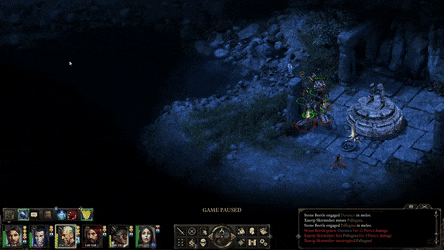
A final point on the writing--Obsidian is a little “woke.” There’s really no getting around this one. I’d like to revisit the idea of certain (reasonable) dialog choices not being included in Obsidian’s games, either out of laziness (e.g., in Pillars of Eternity, my character, a priest of Berath, encountered a small chapel to Berath... and all of the dialog choices amounted to “Who is Berath,” “I’ve never heard that title of Berath’s be used before,” even though other dialog checks take your background into account) or from lack of playtesting and feedback (e.g. in Outer Worlds, not having the option to transport a certain character to a different planet on this early quest’s third outcome) but certain decisions and design choices by the studio don’t have that excuse.
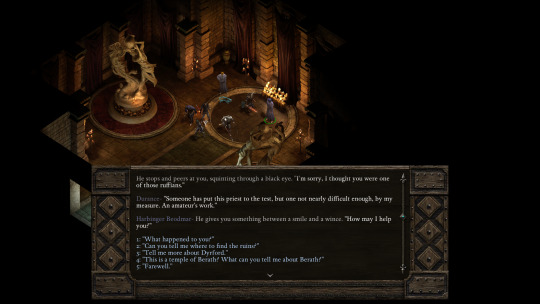
In Pillars, for example, the only way to get a good outcome on one quest and thus significantly raise your reputation in the town, is to lower the price of black market birth control. No moral qualms are raised and no ways for your character to roleplay against this are made available. Prostitutes also exist in Pillars of Eternity (although that feature remains partially broken), and the only way to get a (stackable, temporary) +2 enhancement on your resolve is for your player to solicit a male prostitute in the game. Outer Worlds also features a major quest, where you’re expected to assist one of your companions in getting into a lesbian relationship; again, no way to repel or address any disagreements or differences through your player character’s roleplaying are present. The mentality is like the equivalent of the show Arthur’s episode on gay marriage; “if we don’t address or allow representation for our opposition, it doesn’t exist.” It’s ironically closed-minded and annoying when the game that frames the weight of your moral decisions is so detectably and consistently biased.

Minor spoiler alert, but both games also feature a priest support-character that (at some point in the game) hates their god, and the character leading the not-evil main faction in Outer Worlds was directly inspired by Rick from Rick & Morty--if that speaks anything as to the mentality of this studio. Other choices, such as (in Pillars) winning reputation points by buying and freeing slaves as opposed to killing the slaver and freeing slaves, and winning reputation points for forgiving someone of manslaughter and allowing the person to keep his secret, also speak a little on Obsidian’s morality and inhibit player freedom in additional annoying ways.
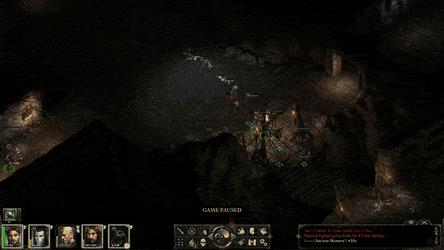
ALL that complaining aside... there is a lot to enjoy. It’s a big world to tap into, and it does have a sequel where you can import data from this game into that and have some of your major decisions be reflected in that game as well. It also features a stronghold (a Kickstarter stretch goal) that the player can manage--some meta knowledge of the game’s upcoming events and mechanics helps a lot in this, but it’s certainly a unique addition to this type of RPG and is genuinely a fun thing to work with. The combat mechanics are fun, although in many situations, it felt far easier to cheese the opponents’ pathing A.I. by luring a single enemy away, murdering him, and saving the game (note: both Pillars and Outer Worlds will likely leave you with a mess of save files after one playthrough), rinsing and repeating, and it would have been a welcomed feature had there been a button to change all party members’ weapons at once (which is helpful in that strategy, where you shoot a character, run away, and then beat on him/her/it as a group with swords) but the combat was still overall fun (albeit perhaps tiring and a monotonous after long hours of play.) The player economy is relatively punishing, with found items typically holding around an eighth of their sale value when you resell them, but this too is manageable (especially if you exploit a money glitch like the one from the first town.)
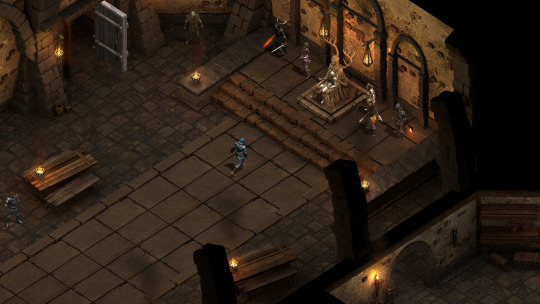
Obsidian can make a good game. It’s just disheartening to see that many of its flaws are systematic.
Ratings:
Pillars of Eternity - Definitive Edition: 7/10
The Outer Worlds: 8/10
Follow twitter.com/will_salsman for more content!
0 notes
Note
Hey Faun, and anyone else majoring in Comp. Lit, what are the advantages of choosing Comp. Lit over English? How is it different? Also, what language did you learn for it?
Response from Faun:
Thanks for your question! I actually wrote a bit about my thoughts on the major in an earlier post way back when, so feel free to check that out too, but to summarize, the key aspects that drew me to comp lit included the smaller size of the department, the relative flexibility of course requirements, and the fit with my own academic interests (i.e. learning languages, world literature, translation, etc.). English and comp lit definitely share a lot of similarities, specifically in how they allow concentrators to deeply engage in close reading and literary analysis while gaining exposure to a myriad of different works, but they certainly differ as departments and fields in significant ways as well. To my understanding, comp lit centers itself on the study of literature and the humanities across boundaries of language, culture, history, and so forth—in other words, as the name suggests, in comparison. As such, it’s a super interdisciplinary subject, and ~comparatists~ (as people in the field are so dubbed) often work with material beyond what would be traditionally characterized as “literature”; many of my classmates and instructors have written about music, visual arts, film and media, and more for their research, and a big part of our discussions in the junior seminar have been about what even constitutes the definition of literature. And of course, proficiency in languages and translation is also a critical component of the major, which I think is the probably the most notable difference between comp lit and English.
I can’t speak too much to what the English major is like beyond my tangential familiarity with the program and a couple classes I’ve taken in the department, but I can share a little bit of why I ended up choosing comp lit over English when it came time to declare concentrations. Part of the reason, as I’ve already mentioned, had to do with department size; generally, comp lit is a fairly small department, averaging at ~20 upperclassmen at a time (versus ~70 in English). This fall, I’m taking COM 300 alongside all the other comp lit juniors, and I’ve got to say, there’s something quite neat about being in a class with everyone in your major and getting to know them all as cool individuals. :) Another plus of being in a rather ~intimate~ department is having a greater access to resources, whether that means more one-on-one interactions with professors or more funding for research and other projects. For me, what ended up kind of driving me away from English was how much more restrictive it was in terms of its distribution requirements; I also felt that the program as a whole tended toward a sort of Ameri-/Anglocentrism that I didn’t 100% vibe with. That being said, I still think it’s a wonderful department, and I have a lot of friends in the major who are happy with their choice. One unique benefit of English is that you have the option of picking a track within the program that allows you to hone in on a specific area of interest, such as theater and performance studies or creative writing, which is especially convenient if you’re looking to pair with certificates.
In terms of my comp lit languages, I’m currently working primarily with French and Chinese, but I’m also in the process of learning Japanese (modern and classical). For the department, you would need to know at least two languages, but you only need to be fluent in one language and demonstrate reading proficiency in the other. I was lucky enough to study French throughout middle and high school, so I was fortunate to have a pretty decent level of fluency in the language upon arriving at college. I’m a Mandarin-speaker by heritage, which means that my writing and reading comprehension are T R A S H, but so far I haven’t taken any classes that have required me to write in Chinese just yet, so here’s hoping I can brush up on those skills before I’m exposed for being a complete and utter fraud lol. Finally, I started Japanese at the 101 level as a freshman, completed the second-year sequence my rising soph summer at PII, and am now pulling a complete ~uno reverse~ by taking Intro to Classical Japanese as a junior before pivoting back to third-year modern my senior year. I’d love to talk about my experience with any of these languages both in and out of Princeton, so feel free to hit me up anytime.
I hope this has been helpful somewhat in providing you with a bit more insight into the comp lit program! Again, I’m always down to chat about all things related to literature and languages, so please reach out if you ever have any more questions on the topic. In the meantime, I’m wishing you nothing but the best.
0 notes
Text
A lengthy family history of Juliette Rodriguez
Warning for... a lot of things, but it’s Julie, so it’s mostly all implied. Implied eating disorder, implied suicidal ideations, heavily implied emotional child abuse. Minor mention of drug abuse, though that isn’t Julie. There’s a pretty snarky discussion of homophobia too.

“My parents got married and had Kathrine super young, though maybe not in that order? I don’t know the exact date of their anniversary, but, like... there’s hints it wasn’t entirely on the up. Stuff like Grandma being just a little bit colder to Katherine than me and Audrey, Dad mentioning their short engagement once and then shutting up fast, just general caginess surrounding why they decided to get married so soon -- I mean, they were eighteen when they got married. My age. That shit just didn’t happen in the latter half of the twentieth century unless it was a shotgun wedding.
“You know, little stuff like that.”
“I think they were actually, like, decent at first? Like, before Mom got her big-shot job at her law firm, back when they still remembered being broke, first generation college kids. Katherine turned out okay at least, so they had to have done something right. And I mean she’s would-maybe-be-chill-with-me-being-gay levels of okay, which in my family is big. But then if I told her, she’d tell Dad, and then Dad would immediately snitch to Mom and let her be the bad guy, and we all know how that would turn out.
“Actually, wait, that’d actually be great if they kicked me out. I could go live with Lucia. Yeah, no, I should totally come out to my family.
“Anyway, yeah, Katherine’s okay, even if she acts like a middle-age soccer mom sometimes... which, I guess she almost comes by honestly now. Fuck, that’s a weird thought. It’s what she gets for marrying a bland white boy, though.
“Honestly, though, I like Katherine. We’re chill. I think she can relate to the way Mom put a lot of pressure on me to keep up my grades, and that being the only way we felt we could win her approval. You know, normal, healthy mother-daughter relationship stuff.
“Audrey, on the other hand, is annoying. Growing up, she thought just being four years older than me made her so much better, and like, I get it. When you’re a little kid, four years is a big difference, so I understand not wanting to play with me, but did she have to be such a bitch about it? And Mom loved her. Katherine was great because she was smart and Mom could brag about her perfect grades, but Audrey was popular. She was the perfect little dress-up doll right when Katherine got to that age when parents stopped being cool, and unlike Katherine, Audrey never grew out of being a whiny little kiss-ass momma’s girl. Well, joke’s on Mom, because her favorite little girl is fucked up. I’m talking sex, drugs, the whole rock and roll. And Mom still has no idea.
“Now that I’m older, though, I honestly feel kinda sorry for Audrey. It can’t have been easy growing up as Mom’s favorite, and I mean that with a hundred-percent straight face. Mom is a lot even when she likes you, and she expected Audrey to be Katherine two-point-oh, only she forgot the reason Katherine was so smart --- because she studied all the time --- was also the reason she never had time to make many friends. I think Audrey reminded Mom of herself at that age, too, only Mom never really figured out that Audrey didn’t have the same ambition that drove Mom through law school, so she kept pushing and pushing to make Audrey fit into the perfect mold she imagined Audrey in, and eventually Audrey just snapped. But she was still skinny, and popular, and Mom still loved her best. I used to loathe Audrey so much for that. I still do, sometimes, when I’m feeling petty.
“Me, though? I was always chubby, even as a baby, and Mom --- being the control freak that she is --- couldn’t stand it. So even from the start she was harder on me than my sisters, and by that time Dad was so whipped that even if he cared, I don’t think he would have done anything about it. And then Aunt Dorothy got her grubby little lesbian hands on me, and it was all over for me. Literally, she was a lesbian named Dorothy. I can’t make this up.
“Aunt Dorothy was the best. Still is --- at least I think, because Mom’s entire family still pretends she doesn’t exist, and I have no idea how to contact her. But this was back before they found out her ‘roommate’ was really her evil gay wife who corrupted Aunt Dorothy’s good Christian soul with her evil gay vagina...
“I feel like that joke doesn’t work as well when one or more of the participants doesn’t have a penis. Oh well.
“What’s important is that I was nine when, through a happy series of coincidences, Aunt Dorothy and her roommate moved to New York at the same time that both my parents’ workloads tripled in the wake of Iron Man’s Senate hearing, and Mom --- having just enough sense to not put the already-spiraling Audrey in charge of nine-year-old me --- needed a regular babysitter. Enter Aunt Dorothy.
“Now, Aunt Dorothy knew her sister, and she knew the kind of backwards-ass, hypocritical, conservative garbage she must have been filling our heads with, so she took it into her own hands to educate us on such matters as fairness, and compassion, and treating people with kindness and empathy, and critical goddamn thinking skills, which had apparently been flooded out of my mother’s head by the endless deluge of lawyeristic doublespeak that is the official language of the corporate cloud she lives in. Audrey had her lips so firmly adhered to my mother’s ass that she refused to hear a word Aunt Dorothy said to contradict our mother’s narrow worldview, but for some reason Aunt Dorothy never gave up on me. Maybe I was more receptive to what she was saying, what with me already understanding on some intrinsic level that my parents’ love was conditional. Or maybe it’s true that gays recognize fellow gays, even before we recognize ourselves.
“In any case, Aunt Dorothy became my hero. Even at home, it was Aunt Dorothy this, Aunt Dorothy that. But still, at nine years old I already knew that certain topics were dangerous at home and that I shouldn’t bring them up. Audrey tattled, of course, and I’m sure Mom yelled at Aunt Dorothy for trying to poison our impressionable young minds with her liberal agenda, but she was still the only family in the area, and Mom needed her to look after us.
“Eventually though, someone on Mom’s side of the family blabbed, or put two and two together, and they figured out she was a dirty filthy lesbian doing dirty filthy lesbian sex with her roommate, and that was the last straw. We weren’t allowed to see Aunt Dorothy anymore. We weren’t even really allowed to talk about her. I think after a few years she moved out of New York again, but I’m not really sure. I used to daydream about her bursting through the door one day and taking me away to live with her and... shit, I can’t even remember her wife’s name. Fuck. I hope they’re okay. I don’t like to think what I would be like today if I’d never gotten to know them.
“Anyway. My parents managed to beat the liberal agenda out of Audrey --- not literally, of course; they may be awful human beings, but they’re not monsters --- but it was too late for me. They tried to turn me around. God they tried, but I was too stubborn. So... well, they didn’t give up trying, but they gave up on me, in a way. They realized they were never going to change me, so they did their best to mitigate the damage. Make me into a private shame, not a public one. Which meant lots of private screaming, and private dieting, and private misery.
“Lucia and her family were really the only things that got me through middle school. I stopped talking even to her about it for a while, at least not explicitly, but... she knew. I think her parents knew too, or at least suspected, but if I wasn’t ready to open up even to Lucia, they knew there was nothing they could really do to help besides feed me extra portions when I was over for meals and love me like one of their own. Honestly, I --- it was bad for a long time. I owe Lucia my everything, and that’s all I want to say about that.
“Fuck, I can’t wait ‘til I graduate and I can get out of here. Screw college, I’m joining Lucia at SHIELD. She’s more family to me than these miserable piles of festering dog crap I call my parents.”
#uhhhhhhhh so this happened#this is NOT an open starter because julie would never in a million years be this open about family matters to anyone who isn't lucia#and not even her sometimes#short leash and a short fuse ( julie )#does it count as headcanon if it's my character? ( about )#after the end ( verse )#suicide tw#eating disorder tw#child abuse tw#drug abuse tw#homophobia tw
0 notes